




Since Pactiv Evergreen’s Canton paper mill closed, many have been left wondering what’s next, especially those who’ve known no other job. However, through a regional partnership, there may be help on the horizon, and those who hire dislocated workers may themselves see some serious benefits. (page 6) Allen Newland photo
Medicaid expansion for North Carolina will go into effect on Dec. 1......................4 State budget delivers wins for WCU................................................................................7 Newman, Phillips vie for Mayor of Sylva..........................................................................8
Bathrooms finally coming to Obama-King Park ........................................................11
Several towns to have uncontested elections..............................................................12
Concern heard for non-residents on Maggie boards................................................15
Lake Santeetlah voter fraud allegations remain at a standstill................................17
Clampitt ceases effort to legislate Swain TDA changes..........................................18 Cherokee inaugurates new leaders................................................................................21
Paper mill logs new violation..............................................................................................23 Education briefs....................................................................................................................25
The perils of an increasingly technocentric society....................................................26 Washington won’t fix health care....................................................................................27
A&E
Wondering why: Brandon Coleman of The Red Clay Strays..................................28 Ready for Plott-Tober Fest?................................................................................................32
Additional 1,250 acres conserved in Maggie watershed........................................36 Notes from a Plant Nerd: Go, go chasing butterflies................................................42
IGITAL MARKETING S PECIALIST Stefanee Sherman.
ADVERTISING SALES: Susanna Shetley.
Amanda Bradley.
Sophia Burleigh.
C LASSIFIEDS: Scott Collier.
N EWS E DITOR: Kyle Perrotti.
WRITING: Holly Kays.
Hannah McLeod.
Cory Vaillancourt.
Garret K. Woodward.
ACCOUNTING & O FFICE MANAGER: Jamie Cogdill. .

stefanee@mtnsouthmedia.com
susanna.b@smokymountainnews.com
jc-ads@smokymountainnews.com
sophia.b@smokymountainnews.com
classads@smokymountainnews.com
kyle.p@smokymountainnews.com
hannah@smokymountainnews.com
cory@smokymountainnews.com
smnbooks@smokymountainnews.com
D ISTRIBUTION: Scott Collier. . . . . . . . . . . . . . . . . . . . . . . . . . . classads@smokymountainnews.com
C ONTRIBUTING: Jeff Minick (writing), Chris Cox (writing), Don Hendershot (writing), Thomas Crowe (writing)
WAYNESVILLE | 144 Montgomery, Waynesville, NC 28786

P: 828.452.4251 | F: 828.452.3585
SYLVA | 629 West Main Street, Sylva, NC 28779
P: 828.631.4829 | F: 828.631.0789
I NFO & B ILLING | P.O. Box 629, Waynesville, NC 28786
Copyright 2023 by The Smoky Mountain News.™ Advertising copyright 2023 by The Smoky Mountain News.™ All rights reserved. Reproduction in whole or in part without permission is prohibited. The Smoky Mountain News is available for free in Haywood, Jackson, Macon, Swain and parts of Buncombe counties. Limit one copy per person. Additional copies may be purchased for $1, payable at the Smoky Mountain News office in advance. No person may, without prior written permission of The Smoky Mountain News, take more than one copy of each issue.

SUBSCRIPTION: 1 YEAR $80 | 6 MONTHS $55 | 3 MONTHS $35











 written by Ingles Dietitian Leah McGrath
written by Ingles Dietitian Leah McGrath

Our children and even our grandchildren are always watching and listening to what we say and do. Making sure your remarks and messaging about food are positive is very important to help children develop a good relationship with their food choices, healthy eating habits and see their body and weight positively.
• Avoid describing food or behaviors around food as “bad” or “good.” Instead, talk about special, treat foods or “sometime” foods and foods that give us energy to do sports and make us strong.
• Avoid hiding food from kids. Hiding foods like candy from kids can increase their curiosity and interest in these foods and the lure of eating something “forbidden” may make these foods more appealing.

• Avoid punishing or rewarding kids with food. Trying to of telling kids that if they’re good they get to eat fast-food puts the emphasis on foods as a reward. Instead of making food the goal, think about other non-food treats for kids….a trip to a special park or the library, a movie, a sticker or small toy instead.
Leah McGrath, RDN, LDN Ingles Market Corporate Dietitian @InglesDietitian
 Leah McGrath - Dietitian
Leah McGrath - Dietitian


perfect for all walks of life, from families to golf groups to ladies who lunch.We pride ourselves on using fresh ingredients from our gardens and supporting local farmers. The details are priority.

the state’s G.O.P. leadership to reconsider, and legislation making North Carolina the 40th state to expand Medicaid passed in March with bipartisan support.
In a news release, Kody Kinsley, head of DHHS, said expansion is the “most significant investment in the health of North Carolina in decades.” The measure, he said, will bring in “billions of dollars” each year, helping to “keep clinics, providers and hospital doors open.”
Once implemented, expansion will loosen some of the state’s long-standing eligibility requirements for Medicaid. Among other things, it will raise the existing income limit to 138% of the federal poverty level. That means single adults, a population that is effectively ineligible for coverage under the current criteria, will qualify if they make less than $20,000 a year.
Parents and caregivers will have higher thresholds based on their household size. A single mother with three children could qualify if her annual income does not exceed $34,000, for instance.
BY JAYMIE BAXLEY FOR NORTH CAROLINA HEALTH NEWS
After being held up for months by the General Assembly’s protracted dispute over a state budget, Medicaid expansion is set to finally take effect in North Carolina on Dec. 1.
The launch date was announced Monday by Gov. Roy Cooper, who called expansion a “monumental achievement” that will eventually provide health insurance to more than 600,000 low-income residents. He also noted that the measure, which was signed into law nearly seven months ago, could have been implemented sooner if not for a provision that required lawmakers to first enact a budget, which they delayed by almost three months.
The N.C. Department of Health and Human Services had hoped to begin moving expansion-eligible people onto Medicaid in October, but the agency was forced to adjust its timeline after overall budget negotiations broke down between the state Senate and House of Representatives. The impasse ended as both chambers of the Republican-controlled legislature agreed to move forward
with an almost $30 billion spending plan.
Despite being strongly opposed to several aspects of the budget, the Democratic governor chose to not veto it and instead allowed it to become law without his signature to clear the way for expansion.


Now, DHHS will spend the next two months readying its local and county partners for the anticipated influx of newly eligible Medicaid enrollees. The department must also release legally required policies for public comment and secure final approval from the federal Centers for Medicare & Medicaid Services, among other tasks.
In an email to NC Health News last week, DHHS wrote that it normally takes 90 to 120 days to implement expansion after a state receives authority to move forward. The department was able to shorten that to 60 days by doing some of the work in advance.



“To be ready once the budget was passed, the team at the North Carolina Department of Health and Human Services has been working closely with implementation partners since the initial passage of Medicaid expansion in March,” DHHS wrote. “In addition, we negotiated a significant compromise from
CMS to pre-submit policy documents to reduce the time to go live once given final authority which enabled North Carolina to be able to go live on Dec. 1 instead of into 2024.”



During a news conference in Raleigh on last week, Cooper said the wait for expansion has been “an unnecessarily long and agonizing journey for many North Carolinians.”
“Since my very first day as governor, getting help to people who need it by expanding Medicaid has been a top priority,” he said. “To many of these families I say, ‘Now, finally, help is on the way.’”


Medicaid expansion has been a decade in the making. Advocates began pushing lawmakers to widen access to the government-funded program after the 2012 implementation of the Affordable Care Act, but their efforts were repeatedly thwarted by Republicans in the General Assembly.
The promise this year of more than $1.4 billion in federal financial incentives prompted
The first residents expected to benefit from expansion are those currently enrolled in so-called Medicaid family plans, which offer fewer benefits than traditional Medicaid. DHHS estimates that 300,000 family plan enrollees will be automatically upgraded to full coverage.
Usually, the federal government picks up about two-thirds of the cost for North Carolina Medicaid patients. But under expansion, federal coffers will finance 90% of the cost for beneficiaries who fall into the expansion category. The other 10% will be paid for in the form of hospital assessments, much of which were offset by a new federal financing reimbursement strategy for hospitals in the state.
Susan Shumaker, president of the Cone Health Foundation, a Greensboro nonprofit that works to address health care inequities, said Monday’s announcement signals the beginning of “a really exciting moment in time for our history in our state.”
“I’m so excited that we’re here because it means so many people who are primarily working in jobs that don’t offer health insurance can have access to care,” Shumaker, who once served as the administrator of a rural hospital, said in a phone interview. “And many of these


folks, as we know, are working in multiple jobs. They’re working on jobs that we all depend on.”
She added that expansion will give hundreds of thousands of residents access to treatment for mental health and substance use disorder. Shumaker said the COVID-19 pandemic created an urgent need for such care.
“The pandemic has had a tremendous negative impact on mental health,” she said. “We’ve had a mental health crisis in this country for a long time, and it’s been heightened by COVID, so I think this is timely.”
that could extend her life by at least 10 years. Without the transplant, her doctors predict she’ll die in less than three.
“Knowing that I can now plan to have this and hopefully it’ll give me more time, I feel I can actually make some plans and look forward to a future,” Brandon said in a phone interview on Monday. “I’m more hopeful.”
But the clock is ticking, she said. The chemotherapy Brandon receives to manage her cancer symptoms may eventually cause irreversible damage to her cells, undermin-

The Cone Health Foundation, the Kate B. Reynolds Charitable Trust and other organizations have pledged more than $3 million to support outreach efforts aimed at people who may soon qualify for Medicaid and not know it. In a joint statement released Monday, the nonprofits wrote that their goal is to “ensure that everyone is aware of the opportunity to get health coverage, and no one is left behind.”
“It has taken a diverse group of stakeholders to speak to the breadth of those living in the Medicaid gap,” they wrote. “Black, white, rural, urban, veterans, moms, health professionals, those impacted by opioid use and many others, all had a place at the coalition tables that pushed Medicaid expansion across the finish line in North Carolina. Their work is the reason we can all mark this momentous policy win.” Other organizations issued similar statements after Cooper’s announcement. Writing in an email, the North Carolina Justice Center said it was “thrilled” that expansion will soon be implemented.
“After 10 long years, over 600,000 North Carolinians are now finally guaranteed a path to health coverage and will no longer have to live in fear of getting sick and facing medical bills they can’t afford,” the center wrote. “We thank Governor Cooper and lawmakers at the N.C. General Assembly for their bipartisan efforts to expand Medicaid. Together, they demonstrated that healthcare is a priority that crosses party lines.”
Dec. 1 can’t come soon enough for DeAnna Brandon, a Rowan County resident diagnosed last year with a rare blood cancer.
Brandon, 45, will qualify for Medicaid under expansion, allowing her to begin the process of scheduling a stem cell transplant
ing the effectiveness of the stem cell procedure.
Anthony Brooks, a Beaufort County man in need of a surgically implanted defibrillator, is also desperately waiting for expansion to take effect. The 58-year-old is about to be kicked off Medicaid because his monthly disability check — his main source of income after a heart attack forced him to quit his job as a nursing assistant — is $7 over the state’s current income limit.
“I’m having to ask my doctors to compile all my prescriptions so I can keep getting medicine for the next three months,” said Brooks, who will qualify for coverage again under expansion. “I’m on a lifeline.”
Lisa Franklin, a soon-to-be-eligible Rutherford County resident suffering from cirrhosis of the liver, doesn’t know if she can wait until December for expansion to launch.

“It greatly affects me that they’re going to delay it that long,” said Franklin, who needs a liver transplant. “Because of that, what may end up happening is I have a decision that I have to make about possibly leaving North Carolina and going to another state that has enacted it.”
That’s not what Franklin wants to do.
She loves North Carolina. Her family lives here. This is where she “decided to plant my roots and settle down,” she said, after moving from Illinois three years ago.
“We need this now,” she said of expansion. “We needed it back in March when it passed to begin with.”
(North Carolina Health News is an independent, non-partisan, not-for-profit, statewide news organization dedicated to covering all things health care in North Carolina. Visit NCHN at northcarolinahealthnews.org. The Cone Health Foundation and the Kate B. Reynolds Charitable Trust provide funding to NC Health News.)
Asubstantial grant from the U.S. Department of Labor has already provided help for more than 50 dislocated workers in Western North Carolina, but Southwestern Commission Workforce Development Director David Garrett wants to get the word out that they’re looking to help a whole lot more.
“We have another 15 months or so, or longer than that, to help somebody if their training goes past that. We’re going to have to start thinking of how we’re going to fund that if it goes past that time,” Garrett said, in response to a question from Haywood County Commissioner Jennifer Best during an Oct. 2. meeting. “So it is time sensitive, and I encourage folks to come talk to a career counselor, come talk to one of our program managers. If you’re eligible now, establish that eligibility. You might not think you want training today, but if that changes in two months, we can still help you.”
Garrett told The Smoky Mountain News last week that they’d already received $2 million in funding, with the possibility of another $4 million to come depending on need, but either way, the funding will expire on May 31, 2025.
The funding is available for dislocated workers — not just from Pactiv Evergreen, but from any enterprise — in Buncombe, Cherokee, Clay, Graham, Haywood, Henderson, Jackson, Macon, Madison, Swain and Transylvania counties who want to learn a new skill or pursue educational attainment up to an associate degree.
But the funding isn’t strictly limited to salaried or hourly workers. Self-employed workers may also be eligible, including contractors affected by a “major economic disruption in the community,” according to the program website, wncdislocatedworkergrant.com.
Even household family members who are dependent on the income of a dislocated worker, like spouses, may be eligible for assistance.
“If there’s a spouse that wasn’t working maybe or had to bump from part time to full time because their spouse lost [their job] we
If you’re a dislocated worker, a family member or an employer, a group of Western North Carolina nonprofits has grant funding that might help you get the resources you need to achieve your goals. The National Dislocated Worker Grant for WNC is administered by the Southwestern Workforce Development Board, the Southwestern Commission council of local governments, NCWorks and the Mountain Area Workforce Development Board. Opportunities are not strictly limited to former employees of Pactiv Evergreen, so visit wncdislocatedworkergrant.com to learn about available resources, and whether you qualify.
have the potential to help them too,” Garrett said. “So it’s not just the workers, it could be their family members too.”
Workers who took “stopgap” jobs for less pay or with longer commutes may also be eligible, and Garrett said he’d love to talk to them.
The website lists more than three dozen separate career tracks for workers, including industrial and building trades skills like carpentry, HVAC and welding; professional occupations like early childhood education, law enforcement, and various computer engineering certifications; and medical or health fields like medical transcription, nursing and radiology.
The funding is available for dislocated workers — not just from Pactiv Evergreen, but from any enterprise ... who want to learn a new skill or pursue educational attainment up to an associate degree.
Managed by a consortium of well-known WNC nonprofits, namely the Southwestern Workforce Development Board, the Southwestern Commission council of local governments, NCWorks and the Mountain Area Workforce Development Board, the funding doesn’t have to stop once retraining is complete.
“In a perfect world, we’re going to not only pay for your training. If you’re still eligible right there, we’re going to make those placements straight to an employer that’s hiring,” said Garrett.
Employers looking to hire dislocated workers can also cash in — Garrett said the funding can be used to offset 50% to 75% of the wages of their new hires for up to 1,000 hours, or about six months.
“There’s always a skills gap when you hire somebody, and it’s very expensive to bridge that gap before they become an effective worker,” he said.
Garrett is especially interested in getting that message out to local and regional employers, so as much of the funding as possible remains in the area.
Since July, the program has served 53 people, according to Garrett. A majority of them, he said, are former employees of the Pactiv Evergreen paper mill in Canton, which unexpectedly announced back in March that it would close in June. When it did, about a thousand workers were directly affected.
August 2022. The August figure is the lowest of the state’s 15 MSAs.
North Carolina’s Department of Commerce estimates that in the MSA this past August, there were a total of 208,300 nonfarm jobs, up 1,200 from July and up 5,700 from August 2022.
The professional and business services sector led the way by adding 1,800 jobs, an 8.5% increase from last year. Positions in the education and health services sector grew by 6.4%, or about 2,300 jobs.
Manufacturing job growth, however, has been flat. Figures show a net loss of 100 jobs over the past year, leaving 22,100 manufacturing positions in the MSA. But that’s a net loss — without shedding hundreds of manufacturing jobs at Pactiv Evergreen back in June, the MSA would have seen strong growth in the manufacturing sector.
“To be honest with you, I’m not sure if we’re going to see a big uptick in [unemployment claims],” Garrett said.
So far, it’s not materialized.
Unemployment in Haywood County was just 3.2% in August, up from 3.1% the previous month. That figure gives Haywood County a ranking of 15 out of all 100 North Carolina counties. In August 2022, when the mill was still operating, unemployment was 3.5%.

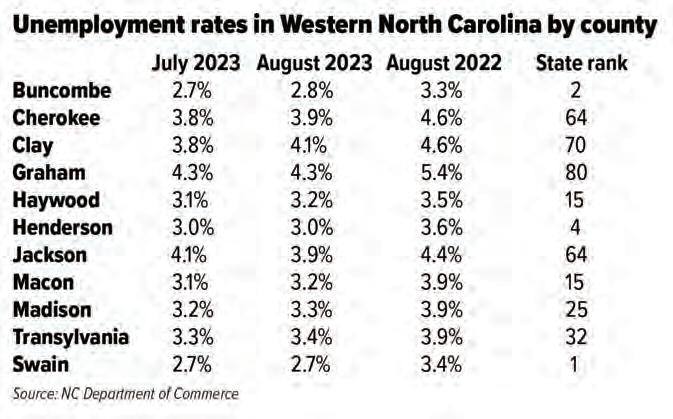
There are still about 40 workers at the mill who have been working simultaneously at keeping the lights on and shutting the facility down. Garrett said they’re trying to get to those workers as soon as possible to ensure a soft landing when they’re finally released near the end of this month.
The ripple effect of the mill’s closing on other businesses and workers can’t conclusively be measured, however Garrett said he’d heard that only 47 workers have drawn unemployment compensation to date. That tracks well with statistics from the state agency responsible for measuring the state’s overall economic health.
Within the Asheville Metropolitan Statistical Area, which includes Buncombe, Haywood, Henderson and Madison Counties, unemployment as a whole was 2.9% for August, unchanged from July and down from 3.4% in
Other counties in the 11-county region affected by the grant show similar figures. Swain County is ranked first in the state, with an astonishingly low 2.7% unemployment rate. Buncombe County ranks second, with 2.8%. Unemployment rates are still above 4% in Clay and Graham counties, ranking them at 70 and 80 respectively — in a very competitive state — but most economists agree that anything under 6% is still considered “healthy.”
Commissioner Brandon Rogers commended the Southwestern Commission for its rapid response to the Pactiv Evergreen crisis, and its continuing involvement.
“From the day we found out that Evergreen was closing, you guys were on the scene the next day here,” Rogers said. “Maybe that same day.”

new model looks at completed hours, not enrolled hours, and weights recommended funding based on the school’s performance in various areas.
At WCU, those performance metrics are four-year graduation rate, undergrad degrees conferred compared to total student population, transfer student debt, first-time freshman debt at graduation, education and related expenses per degree and, finally, the number of health sciences and STEM degrees awarded. Each school is given a baseline goal and a stretch goal for these metrics — meeting the stretch goal unlocks additional performance funding, even if enrollment doesn’t grow at all.
This is the first year that funding recommendations have been determined solely by the new model. The university met all its baseline goals and five of six stretch goals. The only stretch goal it did not meet was the four-year graduation rate — its actual rate of 46.7% was above the baseline goal of 46.5% but below the stretch goal of 52.8%.
Thinking about the four-year rate is “a bit of a shift” for most universities, Byers said, because in the past they’ve been judged based on the six-year rate — the four-year timeframe doesn’t leave room for a semester off to earn money or a change of major midstream.
“It’s still a fair measure,” Byers said. “You’re never going to get 100% of them to graduate in four, but the more you get the better, because it means less debt and less expense.”
BY HOLLY KAYS STAFF WRITERThe newly adopted state budget is good news for Western Carolina University, according to Vice Chancellor for Administration and Finance Mike Byers.


“The legislature and taxpayers were very good to WCU this year,” Byers said. “We received virtually everything we asked for, so many thanks to the legislature for the investment they’re making in Western North Carolina through WCU.”
Top of WCU’s legislative agenda for the last term was funding for a beefed-up engineering program and, eventually, a new engineering building. The legislature granted that request. WCU will receive a recurring $3.5 million for its engineering program, which will allow it to hire new faculty. A one-time appropriation of $2 million will be used to start planning efforts for a new, $95 million engineering building. The planning process is expected to take 18-24 months, with a similar timeframe required for construction, Byers said. Assuming future funding falls into place as needed, the new building could open in three to four years.
Improved compensation for faculty and staff has also been a top request to legislators, and like all state employees, WCU’s workforce will receive a 7% raise over two years — 4% for this year retroactive to July 1 and 3% for the fiscal year starting July 1, 2024.
WCU received a larger overall budget thanks to the University of North Carolina System’s newly adopted funding model, which recommends funding based partially on the school’s past performance.

WCU came out ahead compared to the old model but is limited as to how it can spend the extra money from its high performance over the past year. That’s because the legislature funded the performance portion of university funding with non-recurring funds, rather than with recurring funds as requested by the UNC System.
“Since we performed well, we’ll have some additional funds that we can spend on necessary, non-recurring stuff,” Byers said. “We can buy equipment and things that we need that you only have to pay for once. But we couldn’t hire additional faculty, or we couldn’t give raises with it, because that’s a recurring cost.”
The model replaces a decades-old funding formula that relied on the change in enrolled credit hours, with various multipliers related to the cost of delivering those credit hours, to arrive at a funding recommendation to present to legislators. The

While WCU came out ahead under the new model, Byers noted that in addition to rewarding good performance with increased funding, the model punishes poor performance with decreased funding.
“I can see where someone could have a bad year and it could be hard to get yourself back out,” he said.
Missing in action for more than 54 years, Air Force Capt. Frederick Mervyn Hall of Waynesville will return home for a memorial service and burial next week. All of the events are open to the public, but times could change depending on weather and traffic. If you’d like to pay your respects to Hall and his family, here’s how you can do so:

SUNDAY, OCT. 8
Hall’s arrival will take place at Greenville-Spartanburg International Airport in South Carolina around 1:30 p.m. before escort back to his hometown via motorcade. Under normal conditions, the drive takes about two hours. Those who wish to welcome him home are encouraged to gather near Wells Funeral Home.
TUESDAY, OCT. 10
A memorial service will be held at Hall’s church, First Presbyterian, at 11 a.m. The memorial service is open to the public, but capacity is limited. At the conclusion of the memorial service, those who wish to pay their respects should line Main Street as the procession makes its way to Green Hill Cemetery. The graveside service will be open to the public, but parking can sometimes be a problem, so plan ahead. After the graveside service, a reception will be held at Wells Funeral Home. The reception will be open to the public.

When Sylva residents go to the polls, they will be choosing a mayor to lead the town through several big projects lined up on the horizon.
Between the N.C. 107 road-widening project, the future of Pinnacle Park, Allen Street repairs and constructing downtown public restrooms, Sylva has a lot on its plate.
More than 50 people attended a candidate forum hosted by Indivisible Common Ground WNC on Sept. 28 at the Jackson County Library where candidates answered questions submitted by audience members prior to the event. In addition to speaking their mind on the issues facing Sylva today, all candidates implored people to get out and vote.

In 2021, voter turnout came in at 16.5%, with 249 of 1,511 registered voters casting a ballot. That number was slightly less than the 256 who voted in 2019.
Early voting runs from 10 a.m. to 5 p.m. Monday through Friday, Oct. 19 until Nov. 3, and 10 a.m. to 3 p.m. Saturday, Nov. 4, at the Jackson County Board of Elections. Voters are now required to show ID when voting, but a special voter ID can be requested from the Board of Elections during early voting. Election day is Nov. 7.
In the mayoral race, incumbent David Nestler did not file for reelection. Council Member Natalie Newman and Sylva resident Johnny Phillips have filed to run for the seat.
Natalie Newman was first elected to Sylva’s town board in 2021, when she beat out two incumbents and garnered the most votes of any candidate. In addition to her role on the town board, Newman serves on the Main Street Sylva Association Board and as a Jackson County Chamber Ambassador. She has lived in the area since 2011 and works as a property manager.
Johnny Phillips is originally from Sylva and spent 30 years working for the North Carolina Department of Transportation, followed by time in the private sector. Phillips also has extensive experience serving on and chairing public boards.
This year isn’t the first time the N.C. 107 project has been the dominant issue in a Sylva election. Back when right-of-way acquisition was about to begin, candidates in the race for town board in fall of 2019 focused much of their attention on the road project.
Now, with several local businesses forced to close and relocate due to right-of-way acquisitions, candidates running for town council are addressing concerns like how to balance a budget that will see a reduction in revenues due to those businesses closing for the road-widening project, and how best to support those that have been forced to move.
Here are candidates’ answers to the questions.
Phillips: Representing the town of Sylva is a part of the mayor’s job. Going out and meeting with citizens, business owners, dignitaries that come to town, whatever that may be. I’ve served on many boards. One particular board I served on for 16 years, the Alarm System Licensing Board, I was the chairman of that board for five years. I was appointed by the lieutenant governor, I was appointed by the governor, I was appointed by the attorney general, so I’m pretty well versed with those folks and that sort of thing.
The budget is the biggest thing going on in Sylva. We’ve got a $300,000 loss in revenue from 107. I have inquired with our senator, Kevin Corbin, and he’s looking into the fact that there may be some legislative money that can be given in lieu of those taxes during the life of this project, which would give us five years to figure out how to build enough businesses back to make up for what we’ve lost.
Newman: “I know I’ve got some big shoes to fill. Lynda Sossamon did a lot for this town, and I look up to David Nestler, our current mayor. David and I don’t always agree on things but one thing I can respect is that he does his research, he talks to people and he speaks up, and that’s one of the things that I admire about him and one of the things that I look forward to giving our community serving as your mayor.
I enjoy helping people. One of the things I really enjoy is connecting people to resources and I think as mayor, you have to look for alternative resources when the budget is not there for things to happen. Lynda did a great job of that. I look forward to looking for those alternative solutions. Most of all I want to go out and represent Sylva in a positive light. I love it here and more than anything, I cannot stress this enough, I want to serve the people of Sylva because I feel led to do that.
Newman: Just like our mountains, our waterways are a big part of this community. For a long time, Sylva’s drinking water came from Fisher Creek Waterway, and it was protected and the town owned it. In the 1990s, Tuckaseegee Sewer and Water Authority was formed, and we outgrew that waterway and we now source water from Cullowhee. We, as a town, were left with a 1,000-acre watershed, and the early proposals were to log the land and make money off the timber. There were other ideas like selling off the land. The town decided to preserve that area and in exchange for doing that the state gave us around $3 million, which is now the Fisher Creek Fund. Now Pinnacle Park is protected and maintained. There are educational aspects, recreational aspects as well and 40% of those funds are held to preserve water quality … The biggest thing as mayor is advising the board that we should try not to deplete those funds for any reason outside of preserving that park for our community. In the past money has been taken from that fund to balance the budget, and really that needs to be allocated and used for Fisher Creek preservation and Pinnacle Park preservation. So as mayor, that’s how I would advise the board is to continue to funnel that money to what it’s supposed to be used for.
Phillips: Growing up here, I’ve spent many hours on Fisher Creek. There used to be good speckled trout fishing up there. I’m proud that our town is trying to take care of that. Without the knowledge that Mayor Nestler has right now, I’m not privy to exactly where the money came from and what kind of grants are there, what’s not there, how
much is matching, what’s not matching, but I am in favor of taking care of our environment and most definitely our watershed.
Phillips: Everyone knows that the N.C. 107 project is a tremendous blow to the Town of Sylva. I don’t know exactly how we got to where we’re at with sitting back and watching 42 businesses be torn down, but that’s where we’re at. So, it’s a $300,000 loss of revenue, and we’ve got to figure out how to make that up. There are several avenues. One, is the fact that there is some legislative money that we can get in lieu of the missing taxes during the life of the project. There’s also a way to get our hands on some of the excess right-of-way where we have total takes — they’ve taken a whole building and they only need 30 feet, the rest of that is considered excess right-of-way. The first option for NCDOT is they can sell it to the adjoining property owner for fair market value. The second option is one not many people know about, but municipalities can acquire it for free. It’s supposed to be for public use, but there has been a precedent set that two different governors have allowed it to be used for business development. Some of the businesses that are relocating will make up for some of that and will stay in the Sylva city limits, but the last thing I want to do is cut back on services and I do not want to raise taxes.
Newman: There are a lot of things that we can control and then there are a lot of things that we really can’t control. Whether you like it or not, the N.C. 107 project, the R-5600 project is happening. What I’ve loved about being on this board so far is seeing how forward-thinking and how intelligent the people involved on the board and in our town staff and our town manager are; going to our retreat and seeing that we’re looking years down the road as to what we can do to support our community and to overcome the challenges that we’re going to face with the R-5600 project. When it comes to the budget, focusing on our needs … nobody wants to raise taxes. We have long hard discussions before we raise taxes. [Last budget cycle] it came down to, we had to raise taxes to be able to keep the quality of life that the people in Sylva have … But as far as raising taxes, if it comes down to it and we have to, it’s really a last resort.
Newman: I think top of my list would be building and strengthening our relationships with our county representatives. I think that’s important, and they F
are there to help us get things done. There are some things that we can’t do without the help of our county commissioners, our county leadership. I think it’s also important to focus on those relationships that we have with the leaders in our region. I like talking to people, I like meeting people, I like having those relationships and having those conversations and I think that’s why I would be a great mayor.
Housing is an issue in our community, affordable housing is an issue in our community. We may not be able to make a huge impact; however, we can make an impact in building those relationships and advocating for affordable housing, mental health, substance abuse, all of that. We can advocate for that and build those relationships with our county leadership and with the leaders in our region that can help make those things happen in our community and in our area.
Lastly, I want to see a bigger connection between our board and the people in our community. There are so many times that we are in a boardroom by ourselves. I want to see more of an open house type deal for the people that live in Sylva. I want to be able to inform people about the goings on in Sylva and be even more transparent than we already are and to be able to have those communications and those relationships with each and every citizen in Sylva.



Phillips: I would like to see a streetscape project on Back Street. We’ve done a nice one on Front Street and it looks much better; Back Street is a little embarrassing for those of us that are from here. That’s one thing I’d like to see done.

I am very proud that we’re building these [public] bathrooms, our town desperately needs them. I hope we can upgrade the ones at Poteet Park after those are finished. I’ve met with Paige [Dowling, town Manager] and I’ve also met with Jake Scott [public works director], I’ve been on a tour of the Allen Street fix, I would propose that we promptly put a two or three-month wait on Bryson Park to make certain the fix stays before we spend park money on it, I’d like to see that done.

We’re having a whole lot of citizens building substandard sidewalks that are not ADA standard and they are really a danger to the handicapped folks out in our community. The better way to do that is to reserve the right-of-way to do that when you have a change of use, and the DOT grant money to build sidewalks that actually meet ADA standard, but you have to go by DOT standard.




Phillips: There are some repairs that need to be done to the railroad between Sylva and Dillsboro, and there’s possibly some infrastructure money within the Department of Transportation that we might be able to get for that. If we could convince the train to come back to Sylva and bring that sidewalk full of people in Bryson City up here for about three hours to spend money every day, you might be surprised how many businesses pop up. I’d be your mayor that would be making an appointment with Mast General Store trying to get them to come to Sylva once we have a sidewalk full of people. That’s the most visited place in Haywood County. We already have some very nice events going on at Christmas time, but wouldn’t it be nice to have Thomas the Train?
Newman: Five years from now I would love to see the NCDOT has finished up the N.C. 107 project and people are building on 107, local businesses and that sort of thing.
Housing is really important to me. I work as a property manager. I manage 76 properties in Sylva and Cullowhee. So, a lot of times I’m getting those calls from people in our community — now these are teachers or people who work in the trades, people who make up the fabric of this community — that are calling me, sometimes crying because they don’t have a place to live. Or they’re telling me ‘I’m living in my car and I need somewhere to go’ or ‘my landlord is selling my house and I need somewhere to live.’ What I would like to see different in five years, I would love to stop getting those calls. I want people to have the housing and the resources that they need and have a safe place to stay in this beautiful community that we have here.
As far as staying the same, it comes back to community. I want to continue to see us be this tight-knit community. Regardless of whether we agree or not I care about every person in this community.
I would love to see Sylva continue in five years to be the place that I’m proud to live in and proud to work in and proud to raise my two little girls in as well.
Have

COME IN!!
a cold beer or wine and walk down memory laneNatalie Newman Johnny Phillips



After years of delay, the tiny half-acre park off Pigeon Street in the heart of Waynesville’s Black community should soon see the long talked-about bathrooms the park so desperately needs.

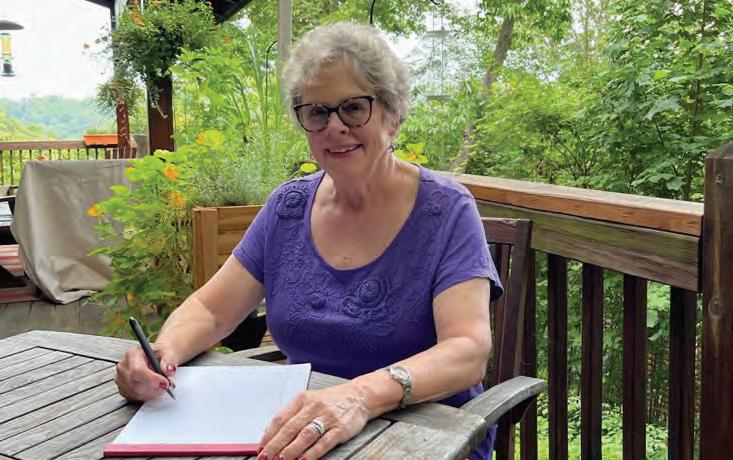
“It’s been a long time coming,” said Council Member Julia Freeman. “I’m thankful we’re finally moving forward on this project.”
Back in 2017, Haywood County government conveyed to the Town of Waynesville three lots on Craven Street, one of which was home to a former church that had fallen into disrepair. The idea was to create a small park there, developed over the course of five years.
Then-chief Bill Hollingshed was supportive of the plan for the parcels, saying the area had become a consistent problem for his officers.
Gavin Brown, mayor of Waynesville at the time, defended keeping the parcels off the tax rolls in perpetuity, calling it “addition by subtraction” — adding to the town’s overall character despite subtracting a relatively small amount of property tax revenue from the town’s future funding stream.
But a lot’s happened since then — namely uncertainty over the future due to the Coronavirus Pandemic, its resulting inflationary pressures and supply chain hangups that continue to affect the construction industry.


In 2020, the town OK’d the park’s name, Obama-King Park. Since then, the half-acre park has taken shape, with a picnic shelter over a concrete pad, a playground, horse shoe pits and grills popping up on the halfacre site. Now, the park serves as a community gathering place ideal for hosting birthday parties, family reunions and holiday celebrations, except for one thing — there’s nowhere to “go.”
On Sept. 26, Town Council approved the


construction bid, but that wasn’t exactly a smooth process either.
The 2023 budget appropriated $80,000 for construction of a family restroom, but after public input the town decided to redesign it to instead feature separate bathrooms for men and women.
The redesigned facility was sent out for bid, but only received one bid. The project was then rebid, but the town didn’t receive any additional bids.
Maggie Valley-based contractor Clint L. Watkins was awarded the $119,130 contract. His bid details $3,000 for site prep, $12,000 for the foundation and $23,000 for decorative stonework, among other items.

Town Manager Rob Hites asked Council to add $20,000 to the contractor’s total, bringing the total project cost to just under $140,000. The additional appropriation was made to handle change orders and to purchase the material to connect water and sewer lines to the facility.
The additional funds will come from the town’s ARP stash; the American Rescue Plan, signed by President Joe Biden in March 2021, guaranteed unprecedented funding inflows to every municipality in the United States.
Due to the small size and odd shape of the park, the footprint of the bathrooms had also been a concern, but town officials seem to have solved that issue as well.
“We’re going to put it on the back of the site, where the hill is the highest,” Hites said.

The facility falls under the purview of the town’s Parks and Recreation Department, which will be responsible for its upkeep. Currently, the town has two large community parks, five smaller neighborhood parks and an emerging greenway system.
Watkins’ bid says he expects the total project term to be 90 days, meaning the bathrooms could be in use as early as this year.


Franklin, Webster, Bryson City and the Village of Forest Hills all have multiple seats up for election this year on their town boards, and each candidate running for those seats is doing so unopposed.

In the Village of Forest Hills, two council seats are up for election in addition to the seat for mayor. Incumbent Mayor Jim Wallace did not seek reelection, but council member Marcia Almond filed for mayor of Forest Hills and is the lone candidate in that race.
Both Almond’s and Nilofer Couture’s seats are up for election. Couture filed to run again, and Larry Ingersoll filed to run for the second council seat.
The Village of Forest Hills was founded in 1991 and incorporated in 1997. It has a population of roughly 330, with its largest expenditures allocated to police patrol and street maintenance. Officers are hired as subcontractors to patrol 18-20 hours per week.
The total 2023-24 operating budget is $102,000. In addition to safety patrols, $10,000 is allocated to the Cullowhee Fire department, $9,900 is put toward professional services to prepare for further development proposals and $8,250 is spent on attorney services.

Two seats on the Town of Webster Board of Commissioners are up for election this cycle, currently held by Brandon Core and Allen Davis, both of whom filed to run for the seats again.
The Town of Webster was established in 1853 when Jackson County was formed from

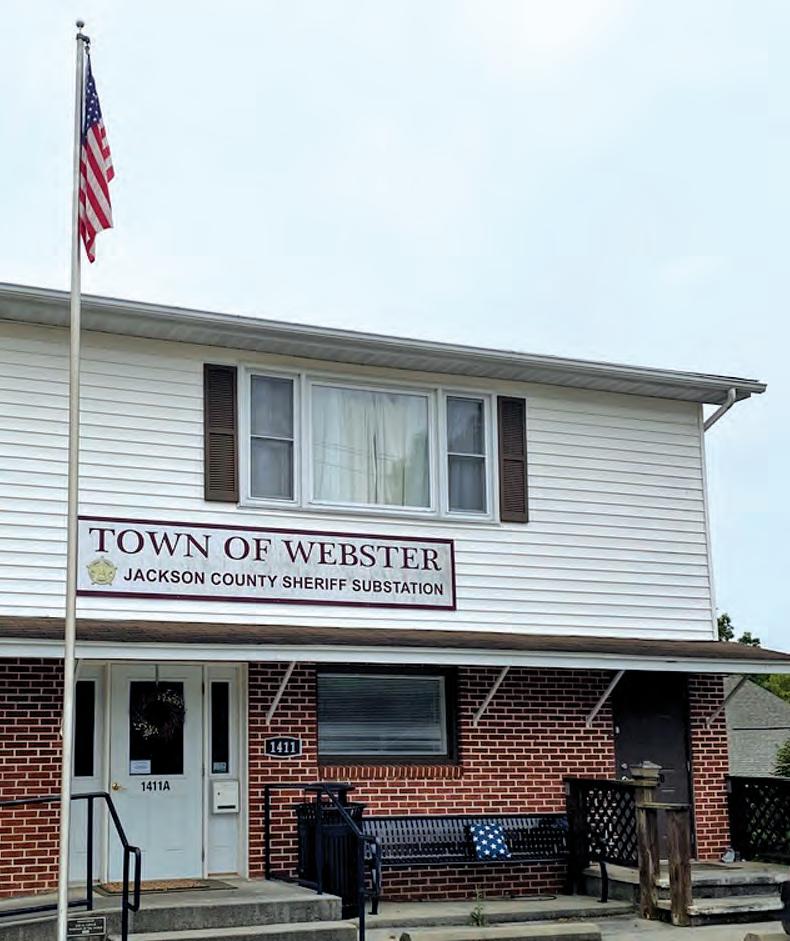

portions of Haywood and Macon counties. For the next 60 years, Webster acted as the county seat of Jackson, until 1913 when it was moved to Sylva. For the following 40 years, Webster had no functioning municipal government. In 1953, Webster’s charter was reactivated and since then it has operated with a five-member town board and a town clerk.
Webster is a similarly small town, only slightly larger than the Village of Forest Hills, with a population of about 380. Its 2023-24 budget came in at $175,500. Of that, $64,200 is allocated for residential services, which include law enforcement, traffic safety and community events. Another $71,300 is spent on government expenses like council stipends, attorney fees, election expenses, payroll, insurance and accounting. The Town has also allocated $40,000 for ongoing repairs and maintenance to town hall.
It may not come as a surprise that two towns with populations under 400 and budgets under $200,000 don’t have enough people lining up to run for public office to create contested elections. However, in neighboring Macon County, Franklin, the county seat, with a population of 4,200, is also facing an uncontested election.
The 2023-24 budget for the Town of Franklin is $11,080,577. Compared to Webster and Village of Forest Hills’ $0.15 per $100 property tax, Franklin’s property tax comes in at $0.33 per $100 valuation. The town provides several services including police, fire and sewer and water.

Mayor Jack Horton is running for another term and is the only F

candidate in that race. Horton worked as Macon County manager from 1985 to 1991, Haywood County manager until 2006, and then again as Macon County manager from 2008 until 2013.
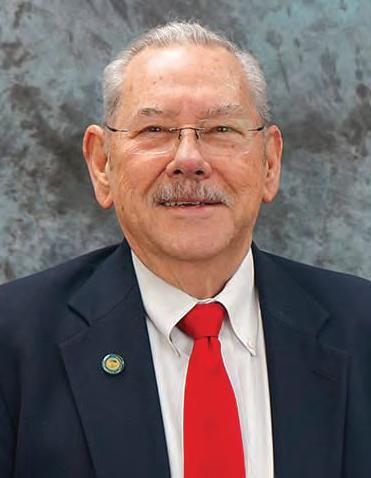


There are three council seats up for election this cycle — those currently held by Joe Collins, Adam Kimsey and Mike Lewis. While Collins and Lewis both filed to run again, Kimsey did not. Robbie Tompa, the only nonincumbnet in the race, filed for that third seat.
“The people of Macon County must think that the current board is doing a sufficient job and that’s why no one else filed against them,” said Macon County Board of Elections Director Melanie Thibault. “I have seeen less people choosing to be involved in town elections.”

Horton had a similar view.





“As a town council, a lot of the comments and responses we got back from the public are positive, so I think that most people, probably not 100%, but most people are satisfied with the job the town council is doing,” said Horton. “I imagine that had something to do with the lack of additional candidate filing to run for public office this go round.”

Horton did not feel pressure to run for mayor again due to the lack of candidates showing up for the race. In fact, he said he had expected someone else to file candidacy for the seat as well, which would have resulted in a contested election.
“If you really have at heart, ‘what can I do for my community to benefit them with the talents and the training and the experience that I have, then I need to use that to benefit my community.’ So, this is a way of giving back,” said Horton. “I think most people in Franklin like a lot of the things that the town council has been working on. Hopefully we’ll continue to do that.”
In North Carolina, if no one files to run for an office in a municipal election, a few things can take place. First, the county Board of Elections can extend the filing deadline by five days, to allow time for someone to file. If no one files during that extension, there is still the opportunity for a write-in candidate to win.
For county, district and statewide office, write-in votes generally do not count. No matter how many voters might write in the same
name, those votes won’t count unless that person whose name is being written has gone through the petition procedure to qualify as a candidate for the election. However, in municipal elections for mayor or city/ town council, write-in votes do count, and no petition procedure is required.



If no one files for the election and there are no write-in votes, no one is elected, and the incumbent will remain in office. This person is allowed to resign at any time, as is anyone holding elected office, and at that point, if the board is non-partisan, the board would be responsible for appointing a new member to fill the vacancy. However, if that board is a partisan-elected board, the political party of the resigning official would be responsible for appointing the next person to serve.

Of the candidates running unopposed in Franklin, Webster and the Village of Forest Hills, only two will be new to the boards, while the rest are running as incumbents.



According to Jackson County Board of Elections Director Lisa Lovedahl, uncontested elections can affect voter participation.
“Uncontested elections usually have lower voter turnout,” said Lovedahl.



Thibault also noted the importance of contested elections for involving the electorate.
“[Contested elections] get more people involved, new faces and different perspectives on the board,” Thibault said.





Elections for the Franklin Town Council are uncontested this election cycle. File photo



Acandidate for Maggie Valley alderman who dropped out and resigned her seat on the town’s zoning board when opponents filed a residency challenge is drawing further scrutiny after an investigation by The Smoky Mountain News revealed that she was not a resident of the town during most or all of her service on the zoning board of adjustment.

On July 31, 2021, Eve Barrett applied to become a member of the town’s zoning board of adjustment, giving her address as 160 Bridle Lane, according to town documents. County records note the address as “Bridle Drive.”
The Bridle Drive address is within town limits; however, Barrett wasn’t registered to vote anywhere in North Carolina at the time, per the Haywood County Board of Elections.
Barrett goes on to affirm in the application that she had been a resident of Maggie Valley since at least 2017, however Barrett and her husband James claimed a homestead exemption for a house in Pinellas County, Florida from 1996 through 2022.
The Florida homestead exemption application requires applicants to affirm that they are “a permanent resident of Pinellas County, Florida, and that you own and in good faith occupy this residence as your homestead to the exclusion of any other permanent residence in any jurisdiction, state or country.”
Barrett’s application goes on to state that any person who knowingly gives false information to claim homestead exemption is guilty of a first-degree misdemeanor, punishable by imprisonment up to one year, a fine up to $5,000, or both.
Barrett was appointed to the Town of Maggie Valley ZBA as an alternate member on Nov. 18, 2021.
She finally registered to vote on April 19, 2022, but used an address on Grandview Cliff Heights, which is not within town limits.
Per state statute, residency is defined as a place where “that person’s habitation is fixed, and to which, whenever that person is absent, that person has the intention of returning.”
On Feb. 16, 2023, Barrett was appointed as a full member of the Town of Maggie Valley’s ZBA, while still registered to vote at the out-oftown address.
Although Barrett was never called to serve in her capacity as an alternate and therefore cast no votes, she did attend three meetings as a full member — voting in two of them despite telling the Haywood County Board of Elections that she lived on Grandview Cliff Heights, outside town limits.
According to town records, in February, Barrett seconded a variance approval for Maggie Valley Storage Solutions. In March, she seconded another variance and moved for approval of another, for Indian Trace. Barrett attended the April ZBA meeting but did not vote.
On July 7, Barrett changed her registration to the Bridle Drive address, which is within town limits. Coincidentally, July 7 was the first day of the candidate filing period for the upcoming November municipal elections.
Barrett subsequently declared her candidacy
for one of two alderman seats up for election, but a month later, a neighbor of Barrett’s on Grandview Cliff Heights told SMN that he believed Barrett and her husband resided there and not at the Bridle Drive address.
That address was and is listed on a number of short-term vacation rental sites like Airbnb and VRBO. Barrett acknowledged the use of the property as a whole-home vacation rental, but claimed that she resides there between rentals.
On Sept. 8, Maggie Valley resident Jeff Lee filed an election protest, claiming that Barrett’s residency on Bridle Lane was not accurate. Four days later, members of the Haywood County Board of Elections voted unanimously to schedule a preliminary inquiry into Lee’s protest. Barrett dropped out of the alderman race the next day, on Sept. 13, and Lee withdrew his challenge.
In a Sept. 19 letter to the Town of Maggie Valley, Barrett resigned her seat on the ZBA, but didn’t mention the election protest.
“I don’t agree with non-residents on our appointed boards. They’re not subject to our town rules. They don’t pay taxes. It deprives town residents and taxpayers of the opportunity to serve.”
 — Allen Alsbrooks
— Allen Alsbrooks
“The Cabin Fairy Realty and Property Management Company is absolutely exploding, and, understandably, I need to focus on what brings me the most joy,” she wrote.
State statues are clear in saying that residence in a municipality is a qualification for elected officials, but they’re also clear in saying that residence in a municipality is not a qualification for appointment to any city office not filled by an election.
There is a caveat, however. Municipalities can stipulate a residency requirement for appointed boards. The Town of Maggie Valley has done so for its planning board but not for the ZBA.
But that doesn’t mean it sits well with candidates and voters. Allen Alsbrooks, who is running in the same aldermanic race that Barrett dropped out of, said that if he’s elected, he’d like to explore the issue further.
“I don’t agree with non-residents on our appointed boards. They’re not subject to our town rules. They don’t pay taxes. It deprives town residents and taxpayers of the opportunity to serve,” Alsbrooks said. “That would be like somebody from Canada coming over to vote in our election. We still have the town boundaries that I think we need to respect. The old cliché is, ‘They have no skin in the game.’ There’s no impetus for them to want to better the town. Somebody could sneak in that’s not interested in the future of the town with an agenda that just doesn’t fit.”
When reached for comment on this story, Eve Barrett declined.


It’s been more than a year since residency challenges were filed against six Democrats who registered to vote at a Graham County home that had burned down and then avoided the challenges by changing their registrations to Buncombe County; the North Carolina State Board of Elections still hasn’t announced the results of an investigation into the matter, even after three of the six re-registered in Graham County, just in time for the 2023 municipal election.
“I’m disappointed that we have not had the state actually seriously look into this matter,” said Diana Simon, a member of Lake Santeetlah’s Town Council who filed the challenges. “Other municipalities that have a majority of second-home owners, this matters in their elections.
In June 2022, Simon filed a series of residency challenges against eight individuals that she and others said didn’t live in their tiny, rustic vacation home community and therefore shouldn’t have been allowed to vote in the 2021 municipal election.
But vote they did, along with 130 others who live within the corporate limits of the municipality — resulting in a 62.5% increase in voter turnout over the previous election and the ouster of two incumbents, flipping the board in favor of an antizoning faction that subsequently cut lake water testing, slashed kudzu removal, attempted to defund the zoning administrator and attempted to abolish the town’s zoning codes.
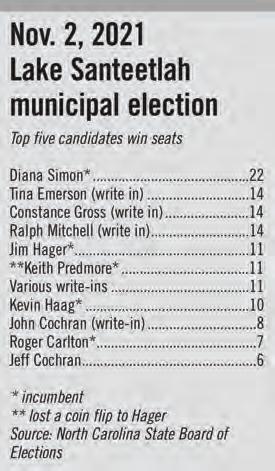
On July 7, 2022, the Graham County Board of Elections determined during a three-hour prelimi-

nary hearing that there was probable cause to suspect that all eight of the challenged voters did not actually reside at the Lake Santeetlah addresses they provided to elections officials when they registered to vote.

In a subsequent 10-hour quasi-judicial hearing on Sept. 28 in Robbinsville, Jack Emerson and his wife, Council Member Tina Emerson, were cleared of wrongdoing despite evidence to the contrary after the Graham BOE determined that voters there could establish legal residency simply by declaring their “intent” to reside in the county.
Alleging that the Emersons actually reside near Charlotte, Simon’s attorney, John Noor, presented witness testimony, homeowners insurance policies, voter history, warranty deeds, photographs and water bills, which were seen as inconsistent with regular habitation of the lake house.



Simon has since appealed the ruling to superior court. A year later, there’s been no movement on the case. Tina Emerson still serves on Council, and Jack is still registered to vote at Lake Santeetlah.
The other six people against whom complaints were filled — Dean Hutsell, a veterinarian with a practice in Buncombe County, his wife Linda, and their daughters Amelia, Kaylee, Olivia and Savannah — registered to vote at Lake Santeetlah in 2021 by using the address of their lake house, which had burned down in 2019 and didn’t have a certificate of occupancy until this past August.
The Hutsells, however, avoided a quasi-judicial hearing by changing their voter registrations back to Buncombe County just before the proceedings against the Emersons took place.
Because the evidence
against the Hutsells was never heard in Graham County, it now appears that voters can register at an unhabitable home, vote from that address and avoid accountability so long as they re-register at another address outside the county prior to any voter challenge proceedings against them being heard by a county board of elections.
There is a backstop to such tactics, but it doesn’t appear to be working efficiently, or at all.
Karen Brinson Bell, executive director of the North Carolina State Board of Elections, told The Smoky Mountain News on Oct. 5, 2022, that her agency was looking into the matter to determine if there were any possible violations of the law.
When SMN requested updates from the investigation on Feb. 15 of this year, NCSBE Public Information Officer Patrick Gannon told SMN that the “State Board staff are reviewing details of this situation, but we do not have any substantive updates to provide at this time. We hope to have more information in the near future.”
When SMN again requested updates from the investigation on Aug. 3, NCSBE General Counsel Paul Cox told SMN, “the State Board can confirm that it considers the information alleged in the voter challenges to be complaints of criminal violations. All complaints of criminal violations are reviewed and investigated by the State Board’s investigations division, as warranted by the evidence and the law.”
Last week, when SMN again requested updates from the investigation, Gannon said, “This matter is still under investigation. It’s an unusual set of facts and circumstances, and as with all investigations, we want to make sure that we are thorough in our process.”
During follow-up questioning, Gannon was asked to cite specific investigatory actions taken
by the BOE over the past year against the Hutsells. Gannon was also asked how many investigations were currently being conducted by the NCSBE, how many investigations have been resolved this year and whether he felt his agency had enough resources to conduct investigations in a timely manner.
Gannon didn’t respond, even though the situation has now taken on an added urgency, just a month prior to the upcoming election in Lake Santeetlah.
On Sept. 20, Dean and Linda Hutsell registered to vote in at the lake house in Graham County. Amelia Hutsell, one of the six challenged voters, was registered there that same day.
“What they have done in this application is say that they have taken residence, that they’ve lived here 30-plus days before they changed their registration [to Graham County], but they do not,” Simon said. “Their home is not occupied and has not been occupied.”
Two other Hutsells not listed in the original complaint, Malina and Amelia, also registered at the lake house on Sept. 20.

Two more Hutsells listed in the original complaint, Kaylee and Savannah, retain their Buncombe County registrations as of press time.
Absent a ruling from the NCSBE, all of the challenged voters will be eligible to vote in the upcoming election.
“This has been going on for two years. People have been fraudulently registering to vote. You’d think it could be resolved before this election. This is a small municipality, this is a small election,” Simon said. “It seems to not be important to the state.”
Dean and Linda Hutsell did not respond to a request for comment on this story.

After some back and forth, things at the Swain County TDA are looking a bit more like the county had hoped.
But that wasn’t always the case. Earlier in the summer, in an omnibus bill that addressed occupancy taxes statewide, Rep. Mike Clampitt (R-Swain) not only omitted a 2% increase in the occupancy tax, he also placed additional administrative constraints on the county’s tourism development authority. The bill sought to essentially create a joint TDA featuring board members from both Bryson City and Swain County with taxes collected in town going to a separate account.
town and county. It also notes that the increase in occupancy taxes is necessary, because as more visitors flock to the area, there is a growing need for services.

“Now is not the time for state mandated structural and administrative changes, and a possible return to a contentious atmosphere where interest groups and individual agendas take precedent over the overall good of our community,” the statement reads. “We can and must work harmoniously together, which is in progress. We don’t need, nor want, a legislative mandate from Raleigh that would expunge a 37-year-old law that has helped bring millions of dollars to our community from visitor expenditures through visitor-imposed occupancy taxes by imposing something that we, as your locally elected leaders, did not request.”


This time, there was a meeting attended by Clampitt, Swain County Commissioners Kevin Seagle and Roger Parsons, Bryson City Alderman Tim Hines and Mayor Sutton, Bryson City Town Manager Sam Patillo and TDA Board Chair Jeremiah Wiggins.

Clampitt said he thought the meeting was productive, and it was after that meeting that he chose to withdraw his portion of the omnibus bill. He said concerns he voiced about transparency and accountability regarding TDA spending were heard, he heard the concerns of other stakeholders present, and that’s why he agreed to withdraw his bill and let Corbin’s get voted through.

“I think concerns I brought to the board, county and town were well addressed and they genuinely acknowledged concerns,” he said.
His effort was similar to one he tried last year. This time, it didn’t take long for local leaders to cry foul.
A Smoky Mountain Times story on the bill cited a two-page statement issued by county commissioners. The statement praises Sen. Kevin Corbin (R-Macon) for trying to raise the occupancy rate from 4% to 6% after hearing their request, while also criticizing Clampitt for stripping that language out of the House omnibus bill.
“He did not advise the commissioners in advance of his intention to dismantle Sen. Corbin’s bill and legislatively amend the original enabling legislation for Swain County to have legal authority to collect the occupancy taxes from visitors,” the statement read.


The statement says the proposal would impose burdensome restrictions on how the TDA can spend occupancy taxes for both the
The feud between Clampitt and county leaders is nothing new. Last year, Clampitt proposed unifying the county’s emergency services with Bryson City’s. However, commissioners bristled at the perceived intrusion into local affairs. At that time, then Swain County Commission Chair Ben Bushyhead and Bryson City Mayor Tom Sutton signed a letter addressed to Clampitt saying that locals weren’t in favor of the plan. At that time, when asked by The Smoky Mountain News whether it was even worth sitting down and listening to Clampitt’s plan, Sutton made his perspective clear.
“We didn’t send him that letter because we wanted to come and think about it,” Sutton said. “I appreciate Mike’s enthusiasm, but we want to have our volunteers onboard for something like that. I was not interested in spending my Saturday afternoon listening to a message that I thought was off the mark.”
Along with serving as county commission chair, Seagle has been the commission’s representative on the TDA board for a few months now. He said the meeting was a bit heated at times, but he agreed that everyone was heard. However, he was also clear that he felt the TDA board has been and still is working efficiently and transparently.
“We’re getting a lot of stuff done,” he said. “I’ve only been here for a few meetings, but it seems like they’re working well together. I think Mike’s perception of the TDA board is something he’s hearing from other people and not necessarily knowing what they’re doing.”
While Seagle said he disagreed with some of what Clampitt was trying to achieve through legislation, he said he was willing to work with him going forward toward whatever’s in the best interest of the county, and in this case, the TDA.

Sen. Corbin said he was happy to lead the effort to bump up the occupancy tax from 4% to 6% since it’s what the folks in Swain County seemed to want, and although it’s technically a tax increase, he was OK with that since the burden doesn’t fall on residents or business owners. Corbin noted that the bill was the first in about 10 years to bump up an occupancy tax and that Sen. Ralph Hise (R-Mitchell), a fellow Western North Carolinian, helped him move it through.
“I did that at the request of Swain County,” Corbin said. “They came to me at the beginning of the session and asked if I would run a clean occupancy tax bill allowing them to charge 2%. It’s a tax on tourists; I normally hesitate to increase any tax, but this is a tax people pay who come to visit Swain County.”
While there was disagreement between Clampitt and Swain County leaders, and Corbin did put forward the bill to raise its occupancy tax at the behest of the county, something Clampitt would not do, Corbin was clear that he still considers Clampitt a friend and ally in Raleigh. Clampitt echoed the sentiment.
“Sen. Corbin and I have a great working relationship,” he said. “That relationship is based on communication and knowing what the other is doing on the other side of the General Assembly, and that will continue to stay that way.”
4.97
7,923 sq ft
276 Welm Way

Franklin, NC
$1,524,900
Luxury, multi-generational dream home boasting 4 master bedrooms with private ensuites and second living quarters with separate kitchen, living area, bedroom, and laundry. Luxury RV pad with power, water, and septic on 600 ft of Tessentee Creek frontage. Vacation rentals allowed.







 BY HOLLY KAYS STAFF WRITER
BY HOLLY KAYS STAFF WRITER
More than 700 people filled the Cherokee High School basketball arena to celebrate the inauguration of new tribal leaders Monday, Oct. 2.

Following a traditional welcome song from the Krazy Nation Singers, a performance in the Cherokee language from New Kituwah Academy students and a rendition of “The Blessing” from Stephanie Brown Scragg, Chief Justice Kirk Saunooke administered the oath of office to the winners of September’s elections for Tribal Council, school board and executive offices.
“I assure you, I do not take this position for granted,” Principal Chief Michelle Hicks said in a speech after being sworn into his fourth four-year term as the tribe’s top executive. “I’m honored to have been elected, and I promise that I will maintain my commitment to this tribe for the next four years. I will work in honor. I will work with integrity to prepare our future generations.”
Hicks previously led the tribe for three consecutive terms, 2003-2015, before declining to run for re-election in the 2015 contest that seated Patrick Lambert. Richard Sneed held the office from 2017, after Lambert was removed by impeachment, until his loss to Hicks this year.
Hicks’ win was decisive, a 65% majority, and came following growing concern from voters about the pace of spending on expensive, far-away business ventures while housing and drug addiction crises persist at home.
In his inauguration address, Hicks alluded to these financial issues, citing the need to “create sustainability for this tribe.”
“Our future must be planned, and our strategies must be calculated through data analysis,” he said. “We must better understand the value of the dollar, and we have to treat it with respect.”
Over the next four years, he said, tribal leaders must do a better job of planning, and of giving clear direction to employees.
Throughout his 10-minute speech, Hicks underlined the link between the past forged by the ancestors of today’s tribal members
and the future that awaits — as well as the need for unity to meet that future well.
“We remember the pain that our ancestors endured for our wellbeing, and we will lift them up and know that their resilient blood that was shed for us through their trials, in their fights, in their battles,” Hicks said. “And we know that that blood flows through our veins, and if we have faith, that blood conquers fear. And it gives us courage to do what we have to do as tribal leaders to create a brighter future.”
In Cherokee culture, good governance depends on input from members of the community, as well as its elected officials, Hicks
“We’ve known each other a long time,” he said. “Plenty of stories to tell. But the story that’s most interesting to me is the story that we can create moving forward.”
After members of the new tribal government found their way out of the packed arena and equally packed parking lot, they traveled 3 miles down the road to the Cherokee Council House, where Ensley brought the new Council to order. After calling Rep. Karl Gillespie (R-Macon) to the podium to deliver a few comments, Ensley opened the floor to nominations for Council chairman, noting that the 12-member body was made up exclusively of men for the first time in “probably over 50 years.” Of the two women who served during the 2021-2023 term, longtime Painttown Rep. Tommye Saunooke died in office last year and Big Cove Rep. Teresa McCoy declined to run for re-election, instead launching an unsuccessful bid for Ensley’s seat.
Following a nomination from Wolfetown Rep. Bo Crowe, Rep. Mike Parker — also of Wolfetown — received unanimous support for the chairman’s seat. Parker previously served as chair in the 2007-2009 term. Snowbird/Cherokee County Rep. Bucky Brown had nominated his fellow Snowbird/Cherokee County Rep. Adam Wachacha, also a former chairman, but Wachacha declined the nomination.
ly a more fiscally conservative approach and a much more measured approach to some of the decision-making as we move forward.”
Parker also hinted that conversations are forthcoming about how and when lobbying trips should occur.
“I want to let you guys know we’ll talk about that,” he said. “We need to develop a strategy I think.”
Tribal Council elected Yellowhill Rep. David Wolfe as vice chair, with no competing nominations. Similarly noncontroversial were decisions to continue using Sally Smoker as Indian clerk, Michelle Thompson as English clerk and Beloved Woman Myrtle Driver as interpreter. In a divided vote, Bobby Taylor was chosen as door marshal.
Parker and Wolfe will preside over an experienced Council devoid of freshmen. While four representatives from the last Council won’t be returning, all of their replacements are former Council members who have served multiple terms.
After electing officers, Tribal Council voted on a single resolution submitted by Hicks. The resolution, which passed unanimously, creates the new position of deputy chief of staff. The position will be funded from the line item designated for the nowvacant Secretary of Agriculture and Natural Resources position, which under Sneed had been held by Joey Owle.
said, and success as a tribe requires unity of purpose.
“Today is a day that we celebrate,” he said. “It’s not a political victory. It’s not a ceremony. But an opportunity to forge our new position as a sovereign nation. We are here today to acknowledge an eternal promise — the coming together of one people. Not one person. One people. And together, we can create great things for future generations ahead.”
In brief remarks ahead of Hicks’ speech, newly re-elected Vice Chief Alan “B” Ensley also spoke of his belief that Inauguration Day is more about the enrolled members and the future of their tribe than it is about the individuals being sworn in.

“I made one promise [during the campaign], and that was I would represent every enrolled member who had a [enrollment] card, I would represent them to the fullest extent,” he said.
Hicks said he is committed to working with Ensley, who has held elected office within the tribe for 28 years.
Taking Ensley’s seat to preside over the remainder of the meeting, Parker said he
The tribe’s new fiscal year started Oct. 1, but it is currently operating under a continuing resolution.
“Obviously, we’re just now getting started with our evaluation of how the overall structure is going to be in place and put before you, but to make sure that we immediately get the office staff, just looking at the overall responsibilities, I think there’s opportunity to maybe shift some of the responsibilities out from under this position,” Hicks said.
appreciated Hicks’ words during the inauguration about unity and coming together. Like Hicks, he emphasized the need for fiscal responsibility in the years ahead.
“I think it’s going to be a good Council,” he said. “I’m hoping our focus will be primari-
However, he told Council, agriculture “definitely will be a priority” for his administration.
Tribal Council adjourned shortly after noon and will reconvene on Monday, Oct. 9, for a new session in the Annual Council that will continue throughout October.




















 BY HOLLY KAYS OUTDOORS EDITOR
BY HOLLY KAYS OUTDOORS EDITOR





The now-shuttered paper mill in Canton has received a new violation for exceeding permit limits on toxicity for water released from the plant, continuing a pattern established over the last two years of averaging more than one notice of violation every two months.
In nearly identical language to a separate notice of violation issued Aug. 2, a Sept. 19 letter from the N.C. Department of Environmental Quality notifies PactivEvergreen that the toxicity levels it measured in June violate the limits in its wastewater discharge permit.



June 2023 was a pivotal month for the mill and for the region surrounding it. Workers left their last shift at the 115-yearold plant on June 8. The mill now sits idle save for its wastewater treatment plant, which under an agreement dating back to the 1960s must continue to treat the Town of Canton’s waste for two years after the closure. The wastewater treatment plant also treats leachate from the mill’s landfill and stormwater flows on the mill site.
The mill’s wastewater discharge permit requires it to perform quarterly tests to ensure that discharge from the plant doesn’t have “observable inhibition of reproduction or significant mortality to Ceriodaphnia dubia at an effluent concentration of 90%.” Commonly known as the water flea, C. dubia is a tiny aquatic invertebrate that is used as an indicator to measure water toxicity. If the species can’t survive, the water quality is likely poor.
A test performed in June showed marked mortality at a concentration of only 45%, well below the 90% concentration for survival stipulated in the permit. Water fleas in the control group produced an average of 29.2 young, with that number dropping to 8.8 young at a 45% concentration. At a 75% concentration, the average was only 1.1, and it was 0 at 90%.


This marks the second quarterly test in a row that the mill has failed. March testing also showed a substantial impact to water flea survival at a concentration below 45%, but June test results indicate an even greater effect. In March, the control group averaged 30.9 young, with an average of 22.2 at a 45% concentration — more than double the 8.8 average observed in June. In results from tests performed 2019-2023, water fleas were able to reproduce uninhibited even at an effluent concentration of 100%. In addition to the failed tests in March and June 2023, the only exception was June 2022, when the result was 97.5%.
The Sept. 19 letter directs the mill, which ceased production in May, to “take whatever
remedial actions are necessary to eliminate the conditions causing the effluent toxicity violation(s).” These efforts could include conducting a toxicity reduction evaluation, a site-specific study to identify what caused the toxicity, isolating the sources of the toxicity, evaluating the effectiveness of toxicity control options and confirming reductions in effluent toxicity.
This new violation brings the mill’s total since May 2021 up to 16, including six in 2023. According to a DEQ spokesperson, the mill passed required follow-up tests for both the March and June toxicity tests, and no further enforcement action, such as fines, will be taken. The mill was not required to file response letters to these violations. Enforcement actions for a July 10 violation, in which DEQ accused Pactiv Evergreen of illegally dumping chemicals into its wastewater system during the shutdown, are under review. In a response letter, the company contested the allegations, saying it had acted “on a good faith belief” that the discharge was legal.

DEQ continues to work with the U.S. Environmental Protection Agency on assessment and remediation for black liquor flows that have periodically been observed seeping into the Pigeon River. Black liquor is a caustic byproduct of papermaking that is extremely toxic to both humans and aquatic life. Pactiv Evergreen’s environmental staff found the substance “visibly present” in the river on Jan. 28, 2022, and it was determined to be related to an ongoing issue that received its first notice of violation in 1994.
According to an April 22, 2022, letter from Collin Day, regional supervisor for the DEQ’s Inactive Hazardous Sites Branch, the discharge into the river is likely associated with this documented groundwater contamination. Also in 2022, Pactiv Evergreen received separate notices of violation from the DEQ’s Division of Water Resources and Division of Waste Management related to he seep.
In September, a comprehensive groundwater and surface water assessment was conducted to shed light on the black liquor issue. Samples were collected at 29 groundwater monitoring wells and four surface water sites along the Pigeon River and will be analyzed for 160 organic and inorganic constituents. Additionally, DWR has been conducting weekly monitoring on the Pigeon River upstream and downstream of the mill since May.

For anyone looking to get into the field of nursing, Southwestern Community College will offer a Practical Nursing program starting in the spring semester.
Applications are being accepted now, and classes start Jan. 16.
It’s a one-year program, and students who complete the classes and clinical work will earn a diploma and become eligible to take the National Council Licensure Examination for Practical Nurses to become licensed at the conclusion of the Fall 2024 semester.
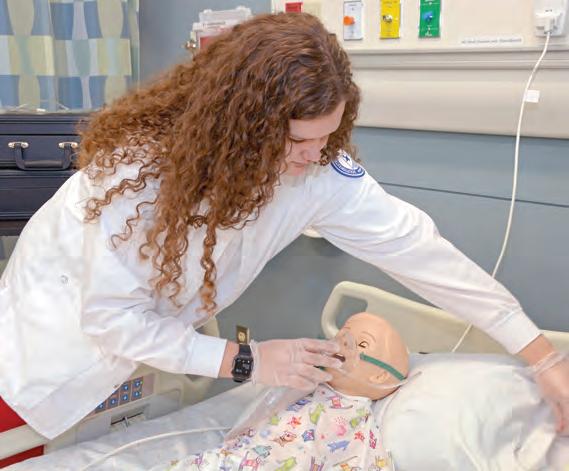
Using a holistic approach, Licensed Practical Nurses (LPNs) aim to improve the health and quality of life of their patients.
“This is a great way to quickly join the nursing profession, or it can be a gateway for getting into our associate degree program, which allows individuals to become Registered Nurses,” said Amy Banner, SCC’s Nursing Program Director. “There’s a tremendous need for LPNs at healthcare facilities throughout and beyond our area.”
Graduates can work in hospitals, long-term care facility clinics and physician’s offices.
For more information, or to apply for this new program, contact Linda Deeb at 828.339.4367 or l_deeb@SouthwesternCC.edu, or Fern Aspen at 828.339.4096 or f_aspen@SouthwesternCC.edu.
Mars Hill University named Greta Byrd as its new vice president for advancement. Byrd joined the university in January as a major gifts officer and has served as interim vice president for advancement since June.
As vice president for advancement, Byrd oversees offices which focus on building trust, goodwill, and financial support for the university. Those offices include alumni relations, donor relations, foundations engagement, and major gifts.
The university engaged the search firm Buffkin/Baker to assist with identifying candidates for the position through a nationwide search. MHU President Tony Floyd says Byrd rose to the top of a very strong pool of candidates.
“I am thrilled to announce the appointment of Greta as our new advancement vice president,” Floyd said. “She has a deep understanding of the unique needs and challenges our university faces. She demonstrated an unwavering commitment to our mission throughout the rigorous selection process and truly stood out as the ideal candidate from an exceptionally talented pool of applicants.
Byrd received her undergraduate degree in psychology from Mars Hill and her M.B.A. in healthcare management from Marylhurst University. She served several years as a member of Mars Hill’s alumni board.
“I am truly thrilled to be taking on the role of vice president of advancement at my alma mater,” said Byrd. “The opportunity to contribute to the growth and success of Mars Hill is both an honor
and privilege.”
Byrd came to Mars Hill following a 30-year career in human services with experience in nonprofit leadership and fundraising. She received the award for Outstanding Woman Nonprofit Leader at the Asheville Area Chamber of Commerce’s 2022 WomanUP Celebration. She also is recipient of the 2023 Arc of Buncombe County Service Award and the 2009 Mayor’s Award for Affordable Housing Development. Byrd serves on the boards of Mountain Housing Opportunities and Arc of Buncombe County.
An East Tennessee State University faculty member has been named to a new state council dedicated to educating young people throughout Tennessee about financial literacy.
Dr. Stacey Fisher is one of six teachers making up the inaugural Distinguished Educator Council of the Tennessee Financial Literacy Commission (TNFLC). Fisher, who teaches at ETSU at Sevierville, is a professor in the Department of Curriculum and Instruction in ETSU’s Clemmer College of Education and Human Development.
Members of the TNFLC Distinguished Educator Council believe strongly in the importance of financial literacy and will help fill the critical need for teacher feedback and leadership as the commission continues to grow. Distinguished Educators can give voice to their own experiences
teaching financial literacy while helping the TNFLC identify areas of improvement and equip their colleagues to provide high-quality financial education in their classrooms.
Realizing she needed to get control of her own spending and debt, Fisher began her journey to financial literacy in 2016. After studying various personal finance leaders and achieving her goal of being debt-free in 2019, she began sharing her newfound knowledge with others.
“I became passionate about helping future teachers learn these principles before they begin their early career, instead of in their late 30s, like me,” said Fisher, who also speaks at peerreviewed academic conferences on financial literacy, personal finance and budgeting; coaches individuals in budgeting and debt reduction; and is licensed to teach personal finance in grades 9-12.
Fisher is co-coordinator of the K-5 Elementary Education Program at ETSU at Sevierville, where she teaches both on-ground and online literacy courses and is a cohort student adviser. She holds a Ph.D. in exceptional learning from Tennessee Technological University, and her research interests focus on family literacy and financial literacy for rural, first-generation college students and non-traditional students. She received the TNFLC Financial Literacy Leadership Award for the East Tennessee Grand Division in 2021
“The teachers chosen as Distinguished Educators know that financial education is important to set children up for success as adults,” said Tennessee Treasurer David H. Lillard Jr. “The council will work to provide feedback critical to ensure the TNFLC continues to offer relevant resources that can be easily incorporated in any K-8 classroom.”
ETSU faculty and staff often win competitive grants and fellowships, using their expertise to improve the quality of life for the peo-
ple of the region and beyond.
To learn more about the Distinguished Educator Council, visit the Distinguished Educator Council page on the Tennessee Financial Literacy Commission’s website, TNFLC.org, which also features valuable education and resources for the public.
As a young boy, Flip Holt didn’t clearly understand the significance of his father’s involvement in founding the institution that would one day become ranked as the nation’s best community college.
As an adult, Holt fully appreciates that his father – W. Paul Holt, Jr. – helped create a legacy that continues to transform the lives of people throughout Western North Carolina.
The elder Holt was a founding member of the Board of Trustees for the institution now known as Southwestern Community College. He served in that leadership role for more than 50 years, including multiple terms as chair, and he also is credited with starting the SCC Foundation in 1973. He was actively serving as a Trustee and a member of the SCC Foundation Board of Directors until his passing in 2018.
The younger Holt and his wife, Cindy, who now reside in Ponte Vedra, Florida, recently decided to expand the family’s prolific impact on Southwestern by endowing two new scholarships while significantly growing several existing scholarship funds through the SCC Foundation.
The new funds will be named the “W. Paul Holt, Jr., Endowed Scholarship” in support of Business Administration programs and the “Cindy and Flip Holt Endowed Scholarship” in support of Health Sciences programs.
“It means a lot to me, and it also means a lot to my wife,” Holt said. “She’s very instrumental in this. She is fully committed and ‘in.’”
Besides launching the SCC Foundation, which aims to provide a “hand up” to students who need financial assistance to pursue their educational goals, Paul Holt endowed multiple scholarships in his lifetime.
He started the “Patricia M. Holt Memorial GED Scholarship” in honor of Holt’s mother, who passed away in 1996; the Andrew P. Holt Memorial Scholarship, named in honor of Holt’s late brother, in support of the Culinary Arts program; and the Brenda Oliver Holt Nursing Scholarship, which honors Paul Holt’s second wife, who passed away last year.
Holt said he and his wife Cindy want to continue that family tradition of supporting the college and its students because they’ve seen the difference scholarships can make in the lives of individual students — as well as the impact SCC has on the communities it serves.
For more information about Southwestern Community College and the career paths it offers, visit SouthwesternCC.edu, call 828.339.4000 or drop by your nearest SCC location.
North Carolina’s Medicaid program will expand on December 1 to offer fully subsidized health plans to virtually every legal resident whose household income is at or below 138% of the federal poverty line.Notice I said “offer.” Many individuals and households who’ll now qualify for Medicaid are already enrolled in other health plans, either through workplaces or the Affordable Care Act insurance exchange. So when advocates claim this will cover half a million or more uninsured North Carolinians, you should know their claim is incorrect.
Expansion will reduce the ranks of the uninsured, to be sure, but not nearly by that much. Many new Medicaid enrollees will be exiting other health plans, shifting more of the cost to taxpayers.
Nevertheless, I write today not to relitigate the case against Medicaid expansion. That would be a moot point. The case has already been decided — and not just by Democratic Gov. Roy Cooper, who spent his entire term in office lobbying for expansion, and Republican leaders in the North Carolina General Assembly, who chose to concede the point last year.

No, the case was actually decided in 2018 when GOP leaders in Washington, enjoying control of the White House and both chambers of Congress, chose to take no substantive action on the core element of the Affordable Care Act — which was, contrary to popular belief, neither the insurance exchanges nor the individual mandate once thought essential to the operation of those exchanges.
Medicaid expansion was always the Obama administra-

To the Editor:
The passage of SB 749 in the North Carolina House of Representatives on Sept. 19, 2023, a bill ironically called “No Partisan Advantage in Elections” removes the selection of local county election boards from the counties and gives that authority to the General Assembly in Raleigh, which at the present time is controlled by the Republican party.
This is the nakedest of naked power grabs. Despite there having been no proven evidence of significant voter fraud anywhere in the US in 2020, Republicans in Raleigh are trying to convince voters that only they can save the country, and the counties (and by inference, Democrats) are not qualified. These are people who are more interested in staying in power than doing what’s right for the country.
tion’s primary goal. At the time, expansion was projected to consume a majority of ACA dollars and account for a majority of net enrollment in health plans.
In practice, the role of Medicaid expansion proved even more dominant. As of 2021, the ACA was responsible for some 17.4 million more Americans being enrolled in Medicaid. The increase in private health coverage was comparatively minor: 1.6 million. That represents the net effect of enrollment in the subsidized exchanges minus enrollment declines for employer-based plans and other private coverage.
That’s where we stand today. Ironically, neither Democratic nor Republican leaders seem satisfied with the results of the Affordable Care Act. Many of the former advocate further expansion of Medicare and Medicaid, with the ultimate goal being a government monopoly over the financing of medical care. Many of the latter continue to vilify “Obamacare” while offering no serious alternative to its current mix of rickety insurance exchanges and vastly expanded Medicaid.
What should North Carolina policymakers do next? Well, they shouldn’t expect any constructive input from Washington. In my view, they should focus on matters over which they retain significant control, such as:
• Competition. As a condition for supporting Medicaid expansion, Republican lawmakers got some modest reforms
I would hope that NC counties would file a mass action lawsuit to repeal this legislation. Writing to your elected representative (mine is at karl.gillespie@ncleg.gov) does no good anymore. Their campaign donors get what they want. Wake up, Republicans, your party has deserted you.
David Stearns OttoThe Smoky Mountain News encourages readers to express their opinions through letters to the editor or guest columns. All viewpoints are welcome. Send to Scott McLeod at info@smokymountainnews.com., fax to 828.452.3585, or mail to PO Box 629, Waynesville, NC, 28786.
of state laws that currently protect hospitals and other providers from competition. Next steps should include completely phasing out our certificate-of-need system (as South Carolina recently enacted) and reforming scope-of-practice laws to let nurse practitioners provide primary care to willing patients at lower cost.
• Transparency. These reforms won’t work if patients and their employers lack prior knowledge of prices and other relevant facts. Providers don’t want to share this information. State Treasurer Dale Folwell has been fighting for transparency on behalf of public employees. Other leaders should join the fight on behalf of all consumers.
• Innovation. From the perspective of patients seeking longer, healthier, more fulfilling lives, some of the most promising developments of the past decade have little or nothing to do with the ACA or other changes in health care finance. They involve pathbreaking new treatments of cancer, heart disease and other fatal or debilitating diseases, such as the use of Ozempic, Rybelsus, and other drugs to combat obesity. Our public policies should encourage such innovations, not subject them to undue regulatory or legal risk.
Empowering patients to make decisions for themselves — and keeping as many of those decisions out of the hands of politicians and interest groups — is the best way to improve health care. Let’s proceed.
John Hood is a John Locke Foundation board member. His latest books, Mountain Folk and Forest Folk, combine epic fantasy with early American history.
Air the laundry. The Smoky Mountain News encourages readers to express their opinions through letters to the editor or guest columns. All viewpoints are welcome. Send to Scott McLeod at info@smokymountainnews.com or mail to PO Box 629, Waynesville, NC, 28786

At four o’clock in the morning, I am fumbling around in the dark trying to make some hotel coffee for the road. Two of those little packets might produce enough coffee to fill half of my thermos, maybe enough to get us to Ohio where we’ll probably want to stop for gas and a sausage biscuit. Might be a hint of daylight by then. It’s going to be a long day.
Now in the car, Tammy is fooling around with the GPS on my iPhone, trying to sync it to my car so she can sleep for just a little bit as we navigate the small towns of Indiana and Ohio before we get to Dayton. If she could just sleep until then, she’ll be hale and hearty the rest of the way back to North Carolina. Oh, the rich and splendid conversations we’ll have if only she is well-rested! Otherwise … well, best not dwell on it.
But the damn GPS won’t sync up. My car is barely a year old. The technology in it is pretty awesome. It tells me when I need to turn my lights on when it starts getting dark, just in case I haven’t noticed. It fusses at me when I don’t drive between the lines. It even tells me when it seems I might want to pull over.
“Consider a break,” it suggests on the dashboard, this advice momentarily replacing the speedometer. The message appears underneath a cup of coffee with three little squiggly lines over to indicate the coffee is hot, unlike my driving apparently.
But the damn GPS won’t sync up, and Tammy is frustrated, rolling through screen after screen looking for an answer. We find that we can play music from my iPhone, but not get the GPS to show up. She reads instructions from Google, following them step by step with the seriousness of someone performing a tracheotomy in the wild, all to no avail. The conversations that follow are vivid, if not completely splendid.
By the time we get to Cincinnati, the GPS suddenly comes on inexplicably, now that we no longer need it.
The following Sunday, I am at home planning to spend a long day playing catch-up on my workload. I teach several online classes, and I have a tall stack of essays and journal entries overdue for some feedback. I turn on some music, put on the coffee, and settle down into my “grading chair” for a long spell of work and jazz.
I find that I cannot log in to my college work platform. I get this message that says I am locked out due to multiple log-in attempts, even though this is my first and only attempt. I will have to try again later or contact my administrator. I try both, but nothing doing. Later, I get a message from my college administrator that there have been numerous log-in attempts from different locations, including Charlotte and Birmingham, Alabama, over the last 24 hours.
Is someone trying to hack into my account?

Maybe they’ll help me with these essays! Maybe
they can attend one of my committee meetings, or deal with half a dozen student issues. Come on in, I say.
But no. They didn’t get in and now neither can I. There is a link to a website attached to the email from my administrator, and it is supposed to help me reset my college email password, but all it does is reset the password to a different email address.



I am still locked out, which presents something of a quandary. My work is over there, and I am over here. If I cannot get to it, I can’t do it. I wait for a while—as instructed by the lock-out message (in bright red letters no less)—but every time I try again, I am like Charlie Brown trying to kick the football, and the log in is like Lucy, pulling it away again and again while the hours melt down into a puddle of nothing and I am even further behind than I already was.
While I am failing miserably at solving this riddle, Tammy informs me that there is a strange, unaccounted for, and quite sizable charge on our bank statement, which we are able to trace to the hospital. Evidently, we’ve paid hundreds of dollars for a procedure no one can remember having.
I have this touchingly naïve thought: I will call them.
“I’ll just give them a call and see what that’s all about,” I say.
“You do that,” Tammy says. “Let me know how it goes.”
It goes like this, if you already know the song and want to sing along. I call the hospital—our local hospital, about 4 miles down the road—and I get someone from some faraway place who is going to “help” me. Customer service has been outsourced to Timbuktu. I ask to be transferred to the business office to discuss a charge.
After some hesitation, I am transferred … to somebody somewhere. I repeat my earlier request verbatim. There appears to be some confusion, as if I just asked the person on the other end to join me for a romantic weekend in the Catskills.

It’s a hospital, and I want to speak to the business office. Surely this is not unheard of.



“Just one moment, sir.”
I am transferred again, and after three or four rings, someone picks up. But instead of a human or nearly human voice, I hear a series of very shrill, very loud screeching noises, quite rudely piercing my eardrums. Is this a fax machine? A roomful of first-graders scratching a giant chalkboard with their fingernails?
I find another number for the hospital and try that one. It’s a local number, so there is hope. Nope, there isn’t. It’s another faraway person. I go through the same series of pointless transfers until I can once again enjoy the same series of screeching noises. There is no escape, no path that will ever lead me to the business office. I know that now.
If all of the wonderful advances in technology have taught us anything, it is this: you can’t get there from here. Consider taking a break.
(Chris Cox is a writer and teacher who lives in Haywood County. jchriscox@liver.com.)

Standing in a narrow, dimly-lit alley behind The Remington Bar — a century-old watering hole in the heart of Whitefish, Montana — this past summer, Brandon Coleman leans against his band van following a fiery performance and slowly gazes up at the twinkling stars high above.

Front man for The Red Stray Clays, Coleman is at the helm of one of the rapidly rising acts in the Americana, alt-country and indie-rock scenes. Bursting out of the ground of their namesake, the red clay of South Alabama, the group is a staggering, devil-may-care juggernaut of sound and scope.
At 27, Coleman possesses a vocal prowess and stage presence that’s part fire-and-brimstone preacher, part nitty-gritty rock-n-roller — both soaked in a fevered sweat while echoing hardscrabble, honest truths of the eternal human condition for any and all to tap into within earshot.
“Music has always been something that I’ve pursued. All I’m trying to do is fulfill God’s calling that He’s put on my life,” Coleman said. “I’m a firm believer that He has put us all here with a job to do and I’m obsessed with getting it done. Everything I do onstage is just self-expression — I act and sing how I feel in that moment.”
At its core, The Red Clay Strays are a roaming band of conduits for connectivity and compassion, this sonic template of real world sentiments and lightning bolt musicality — the main thread running through all music that’s timeless and true.
Smoky Mountain News: As you’ve gotten older, how do you view time and the notion of movement — of speeding up and
slowing down in one’s own existence, whether personally, artistically, or in general — and how it all fits into the grand scheme of things?
Brandon Coleman: I’ve always kind of known that this life is temporary and we’re not here forever, so we need to make every day count as much as we can. One thing I’ve learned with age, is that God will be there for you no matter what. In the last few years we’ve faced so many difficulties and hardships. I’d have to write a book to name them all.
We’ve had reason after reason to quit. But, we kept going through it all and God pulled us through every bit of it. Nowadays, our faith is as strong as it’s ever been, because we know He’s always looking out for us — even if it doesn’t seem like it in the moment.
SMN: In this uncertain era of the music industry, what is it that keeps you going and inspired to push ahead and overcome the tough challenges?
BC: Our justification comes from giving people hope. We’ve had so many people reach out and tell us how our music is getting them through hard times and tragedies in their lives.
So many times I’ve looked out in the crowd and seen people crying while we’re playing songs like “Sunshine” or “I’m Still Fine.” That’s because the songs reach them in ways they needed to be reached. In that very moment, they’re letting go of what’s been bothering them — that’s a very moving thing to see.
SMN: In your travels coast-to-coast, what is it about the people, places and things — geographically, emotionally, culturally, sonically — from each of those specific places you wander into,
perhaps perform in or simply visit by happenstance, that continues to inspire you and your work?
BC: We’ve learned that just about wherever we go, the people are all very similar at heart. The stereotypical things said about different places are mostly false in my opinion. There are “rednecks” in California and New York and there are “city folks” in Alabama and Mississippi.
At the end of the day, we all just want to be heard and understood. One of our favorite things about our shows is that people with completely different views religiously and politically all come together and listen to us play.
SMN: In a modern era of digital distraction and white noise, what is the role of the songwriter in the 21st century?
BC: The songwriter is who creates the message of the song. That’s very important. Especially now, in a time where people are struggling more than ever with mental health — music alone can make you feel emotion, but the lyrics are what speak to your heart.
Acclaimed Americana/indie-rock act The Red Clay Strays will hit the stage at 8 p.m. Sunday, Oct. 8, at The Grey Eagle in Asheville.
opens the show. Tickets are available at thegreyeagle.com/calendar. For more on the band, go to redclaystrays.com.


The 111th annual Cherokee Indian Fair will be held through Oct. 7 at the Acquoni Expo Center site, located at 1501 Acquoni Road in Cherokee.
Somewhere around Schroon Lake, New York, just following a quick hike in the Adirondack Mountains, it was decided to head further down Interstate 87 to I-78, onward through Gettysburg, Pennsylvania, to get to Raleigh, North Carolina, for the International Bluegrass Music Association award show last Thursday.
The trek hovered around 12-14 hours depending on what route to take. The quickest way was along I-95, which is filled with endless traffic and relentless tolls. The long way was through Binghamton, New York, via I-88 and I-81. The middle route, much like Goldilocks and her desired porridge, was not too hot (expensive) or too cold (distance), so I-78 and U.S. 15 through Gettysburg.
Waking up in a Comfort Inn Suites in Bethlehem, Pennsylvania, it was a sunny early fall day in the Keystone State. Warm sunshine. Cool breeze. Crack the windows down slightly in the truck and breath in the fresh air. Following an extended family visit back up my native North Country, I still had to head to the IBMAs before finally landing back in my humble abode in Waynesville late Saturday.
With my girlfriend, Sarah, fading in and out of a road trip nap, I found myself doing what I usually do in those moments of vehicular solitude and silence — lost in thought.

I kept thinking about the rollercoaster nature of family dynamics and whatever crisis was currently overtaking the conversation at the dinner table in my parents’ farmhouse before we left my hometown. Thoughts of the impending fall, haphazard visions of a longgone summer in the rearview mirror.
Stopping to fuel up, I looked at the map on my smart phone. It appeared U.S. 15 goes right through the small town of Gettysburg. Site of one of the bloodiest and most important battles of the Civil War, the historic community was a place I’d only seen one time prior, when I was a junior in college at Quinnipiac University
I was a college athlete running track, specifically the 200-meter race, 400-meter and 4x400-meter relay. The conference championship meet was held at nearby Mount St. Mary’s University just below the Mason-Dixon Line in Maryland. Our team was housed at a Gettysburg hotel, shenanigans afoot as expected.
And I only remember a handful of things from that jaunt those many years ago — we



ate at an Italian restaurant in downtown Gettysburg, this old-school spot with heaping plates of homemade spaghetti; Long Island University showcases some of the fastest runners in the northeast, as seen by yours truly coming in last in the 400-meters; and our hotel was across the street from the battlefield, as I found out when I asked where it was located, the front desk guy pointing out the window into the darkness, saying in a monotone voice, “Right across the street.”
Skip ahead some 17 years and there I was, pulling up to the visitor’s center and museum on a Wednesday afternoon. Midweek and technically off-season until the foliage season emerges, the parking lot was still jammed packed. Mostly older folks, retired and crossing off another bucket list item on their travel wish list. Sarah and I stood out from the masses with our lack of grey hair and eagerness to walk the battlefield grounds instead of doing the one-way drive-thru loop.
I put on my running clothes and laced up my shoes. I wanted to take a steady jog along the roads meandering through the battlefield. Get out of the family car. Get off the tour bus. Disappear down the road and onto a backwoods horse trail, beads of sweat rolling down your face while thinking deeply, reflectively about exactly what transpired upon these sacred grounds almost 160 years ago.
Sarah wandered around the countless monuments dotting the battlefield, scoping out each one and reading the history, words, sentiments and names of those who fought bravely, thousands of which losing their lives in a ripple effect of political, economic and social fervor that still reverberates to this day in America.
While jogging along the road, I saw numerous bumper stickers bashing either Biden or Trump, t-shirts with similar sentiments on those hopping out of the vehicles to check out another monument. I thought of news heard on the radio earlier that day, divisive stories about Trump, Biden, presidential debates, a possible government shutdown, turmoil in the House of Representatives, high interest rates, an uncertain economy and ongoing political strife and concerns overseas in Russia, China and North Korea.
Soon, I found myself alone on the road. Gazing across the battlefield, it was silent and well-maintained. Rays of sunshine cascading

The 15th annual ColorFest will be held from 10 a.m. to 4 p.m. Saturday, Oct. 7, in downtown Dillsboro.

2
3
There will be a special stage production of “Good Ol’ Girls” at 7:30 p.m. Oct. 5-7 and 2 p.m. Oct. 8 on the Fangmeyer Stage at the Haywood Arts Regional Theatre in Waynesville.
4

Outdoor 76 (Franklin) will host its Fall Celebration with a 25/50K trail run at 8 a.m. followed by live music from Rossdafareye (1-3 p.m.) and The Get Down Junkies (4-6 p.m.) on Saturday, Oct. 7.


5
There will be a special presentation by Thomas Rain Crowe on his new book “Painting from the Palette of Love: The Mystical Poetry of Kabir” at 3 p.m. Saturday, Oct. 7, at City Lights Bookstore in Sylva.

down through the clouds and onto the grassy knolls, small creeks, dense tree lines and old stone walls. Silhouettes of dozens of monuments along the horizon behind me, endless fields in front of my position, ancient mountains in the distance.
Coming down a small knoll, I noticed an old farmhouse just a few hundred yards away. The sign in front of the quaint structure stated it was the Trostle House. According to history, “During the struggle for the Union’s left flank, Captain John Bigelow’s 9th Massachusetts Battery was ordered to hold their position at the Trostle Farm no matter the cost.”
The battery was greatly outnumbered by Confederate soldiers. Cannonballs and gunshots rang out in utter chaos. Hand-to-hand combat in the front yard. Bloodshed and murder in the name of one’s justified cause. There was still even a cannonball hole in the brick barn in the backyard, numerous horses killed by it.
Before I turned around and ran back to Sarah, back to the parking lot and back to the truck to continue on our journey to Raleigh, I took a few moments by myself to stand there at the Trostle Farm, staring respectfully and in awe of the cannonball hole in the wall, the lives lost on the property, the rest of the carnage all around the battlefield.
It was a moment of pure reflection, one of introspective inspiration and sheer gratitude towards the continued efforts by many in this country to not ever find ourselves in similar conflicts in our modern era. Nothing is the same, everything is the same, as they say, eh? Truth, my friend.
As an eternal optimist, I hold out hope for you, me and all of us — coming together for the sake of the greater good, for it’s the only way to move forward, come hell or high water.
‘It is for us the living, rather, to be dedicated here to the unfinished work’The Gettysburg Battlefield is located in rural Pennsylvania. Garret K. Woodward photo
Country music legend Pam Tillis will perform at 7:30 p.m. Friday, Oct. 13, at the Smoky Mountain Center for the Performing Arts in Franklin.

With 13 Top Ten hits, six number ones and over seven million albums sold, Tillis has made her mark in the Music City. She’s the daughter of country music legend, Mel Tillis — a singer/songwriter whose compositions have been covered in country, R&B, bluegrass and rock, as well as an actor with a long list of film, TV and stage credits.
Tickets start at $26 per person, with priority seating available. For more information and/or to purchase tickets, go to smokymountainarts.com or call 828.524.1598.
An evening of traditional mountain dancing will be held from 6:30-9 p.m. Saturday, Oct. 7, at the Macon County Public Library in Franklin.
The gathering will open with a half-hour of instruction for beginners, followed by dancing with nationally known dance caller Phil Jamison. All dances are taught — including contras and round dances as well as some waltzes — to the music of the band Late To The Party.
Jamison is a flatfoot dancer, old-time musician, scholar of traditional Appalachian dance, teacher and author. He has performed and taught at music festivals and dance events across the United States and overseas, including over 40 years as a member of the Green Grass Cloggers.
He was inducted in 2017 to the Blue Ridge Music Hall of Fame and in 2022 to America’s Clogging Hall of Fame. Jamison also plays oldtime fiddle and banjo, and he teaches traditional music and dance at Warren Wilson College.
Attendees may come with or without a partner and may bring a water bottle and snack. Wear comfortable clothes. No strong scents, please. People of all ages and experience levels are welcome. Contra dance is an easy to learn and sociable dance form, with participants moving in long facing lines or in groups, changing partners often. First-time attendees and children are admitted free. Admission for others is by donation.
The library has a hardwood dance floor, ample lighted parking and wheelchair accessibility. The event is produced by the Arts Council, Friends of Contra Dance in Macon County and the Macon County Public Library. For more information, call 828.524.ARTS or email arts4all@dnet.net.
A community jam will be held from 67:30 p.m. Thursday, Oct. 5, at the Marianna Black Library in Bryson City.
Anyone with a guitar, banjo, mandolin, fiddle, dulcimer or anything unplugged is invited to join. Singers are also welcomed to join in or you can just stop by and listen. The jam is facilitated by Larry Barnett of the Sawmill Creek Porch Band.
• Balsam Falls Brewing (Sylva) will host an open mic from 8-10 p.m. every Thursday. Free and open to the public. 828.631.1987 or balsamfallsbrewing.com.
• Blue Ridge Beer Hub (Waynesville) will host a semi-regular acoustic jam with the Main Street NoTones from 7-9 p.m. every first and third Thursday of the month. Free and open to the public. For more information, go to blueridgebeerhub.com.
• Blue Stage (Andrews) will host Jim Avett (singer-songwriter) 7 p.m. Oct. 7. 828.361.2534 or gm@thebluestage.com.
The second annual “Frogtoberfest” will take place from 11:30 a.m. to 11 p.m. Saturday, Oct. 14, at Frog Level Brewing in Waynesville.
A daylong event celebrating the fall season, there will be a wide selection of craft beer, live music and food available onsite. The daytime music and outdoor activities are free and open to the public.
The “Frogtoberfest” after-party featuring renowned Americana/indie act Red Clay Revival and The Borrowed Band will kick off at 7:30 p.m. at The Lineside, the brand new Frog Level Brewing indoor venue next door to the brewery. Doors open at 7 p.m. Tickets for the afterparty are $10 in advance, $12 at the door.
For more information and/or to purchase tickets to the after-party, go to froglevelbrewing.com and go to the “Events” tab.
The community jams offer a chance for musicians of all ages and levels of ability to share music they have learned over the years or learn old-time mountain songs. The music jams are offered to the public each first and third Thursday of the month — spring, summer, fall.
This program received support from the North Carolina Arts Council, an agency funded by the State of North Carolina and the National Endowment of the Arts. 828.488.3030.
• Boojum Brewing (Waynesville) will host music bingo 7 p.m. Mondays, karaoke at 8:30 p.m. Wednesdays, trivia at 7 p.m., Rossdafareye (rock/soul) Oct. 7 and Human Nip (rock) Oct. 14. All shows begin at 9 p.m. unless otherwise noted. 828.246.0350 or boojumbrewing.com.
• Currahee Brewing (Franklin) will host “Music Bingo” 7 p.m. Thursdays and Diana Nouveau Oct. 7. All shows begin at 7 p.m. Free and open to the public. 828.634.0078 or curraheebrew.com.
• Farm At Old Edwards (Highlands) will host the “Orchard Sessions” featuring ABC Trio w/Tom Herbort Oct. 12. All shows begin at 6 p.m. Tickets start at $25 per person. For tickets, go to oldedwardshospitality.com/orchardsessions.
• Friday Night Live (Highlands) will host Silly Ridge Oct. 6 and The Foxfire Boys Oct. 13 at Town Square on Main Street. All shows begin at 6 p.m. Free and open to the public. highlandschamber.org.

• Frog Level Brewing (Waynesville) will host its weekly “Tuesday Jazz Series” at 5:30 p.m., Kind Clean Gentlemen (rock/blues) 5:30 p.m. Oct. 3, Seth & Sara (Americana) 5:30 p.m. Oct. 5, Two Armadillos 4 p.m. Oct. 8, Tricia Ann Trio 5:30 p.m. Oct. 11, The Dirty French Broads 6 p.m. Oct. 13, Fall Fest 1-11 p.m. w/live music all day Oct. 14 and Syrrup 3 p.m. Oct. 15. Free and open to the public. 828.454.5664 or froglevelbrewing.com.
• Frog Quarters (Franklin) will host live music from 11 a.m. to 1 p.m. Saturdays. Free and open to the public. Located at 573 East Main St. littletennessee.org or 828.369.8488.
• Happ’s Place (Glenville) will host Whitewater Heathens Oct. 6 and Darren Nicholson (Americana/bluegrass) Oct. 13. All shows begin at 6 p.m. Free and open to the public. happsplace.com or 828.742.5700.
• Harrah’s Cherokee Casino Resort (Cherokee) will host Josh Turner (country) 9:30 p.m. Oct. 6. For a full schedule of events and/or to buy tickets, caesars.com/harrahs-cherokee.
• Highlander Mountain House (Highlands) will host a Sunday Bluegrass Residency noon to 2:30 p.m. and semi-regular live music on the weekends. Tickets are $35 per person. For more information and/or to purchase tickets, go to highlandermountainhouse.com.
• Innovation Brewing (Sylva) will host “Trivia Night with Kirk” from 7-9 p.m. every Monday, Open Mic Night every Wednesday and semiregular live music on the weekends. All shows begin at 7 p.m. unless otherwise noted. Free and open to the public. innovation-brewing.com.
• Innovation Station (Dillsboro) will host “Music Bingo” on Wednesdays and semi-regular live music on the weekends. All events begin at 7 p.m. unless otherwise noted. Free and open to the public. innovation-brewing.com.
• Lazy Hiker Brewing (Franklin) will host “Music Bingo” 6 p.m. Tuesdays, trivia 6:30 p.m. Wednesdays, Open Mic 6:30 p.m. Thursdays and semi-regular live music on the weekends. All shows begin at 7 p.m. unless otherwise noted. Free and open to the public. 828.349.2337 or lazyhikerbrewing.com.
• Lazy Hiker Brewing (Sylva) will host trivia 6:30 p.m. Wednesdays, an Old Time Jam 6:30 p.m. Thursdays and semi-regular live music on the weekends. All shows begin at 8 p.m. unless otherwise noted. Free and open to the public. 828.349.2337 or lazyhikerbrewing.com.
• Lineside at Frog Level Brewing (Waynesville) will host Red Clay Revival (Americana/indie) and The Borrowed Band 7 p.m. Oct. 14. Admission is $10 in advance, $12 at the door. For more information and/or to purchase tickets, go to froglevelbrewing.com.

• Meadowlark Motel (Maggie Valley) will host Trivia Thursdays 6:30 p.m., Celtic Road Oct. 6, Jerry Gaff (singer-songwriter) Oct. 7 and Woolybooger (blue/folk) Oct. 13. All shows begin at 7 p.m. unless otherwise noted. For more information and/or to purchase tickets, go to meadowlarkmotel.com or 828.926.1717.
• Mountain Layers Brewing (Bryson City) will host an “Open Mic w/Frank Lee” Wednesdays, Liz Petty (singer-songwriter) Oct. 6, Scott James Stambaugh (singer-songwriter) Oct. 7, George Ausman (singer-songwriter) 5 p.m. Oct. 8, Mountain Gypsy (Americana/folk) Oct. 13 and Frank Lee (Americana/old-time) 5 p.m. Oct. 15. All shows begin at 6 p.m. unless otherwise noted. Free and open to the public. 828.538.0115 or mountainlayersbrewingcompany.com.
• Nantahala Brewing Outpost (Sylva) will host semi-regular live music on the weekends. All shows begin at 8 p.m. unless otherwise
noted. Free and open to the public. 828.641.9797 or nantahalabrewing.com.
• Outdoor 76 (Franklin) will host its Fall Celebration with Rossdafareye (1-3 p.m.) and The Get Down Junkies (4-6 p.m.) Oct. 7. There will also be craft beer and food available onsite, with a 25/50K trail race to kick off the event at 8 a.m. 828.349.7676 or outdoor76.com/the-naturalist-25-50k.
• Pickin’ On The Square (Franklin) will host The Remnants (rock/variety) 7 p.m. Oct. 7. All shows are held at the Gazebo in downtown. Free and open to the public. franklinnc.com/pickin-on-the-square.
• Quirky Birds Treehouse & Bistro (Dillsboro) will host Open Mic Night at 7 p.m. Tuesdays and semi-regular live music on the weekends. Free and open to the public. 828.586.1717 or facebook.com/quirkybirdstreehouse.
• Salty Dog’s Seafood & Grill (Maggie Valley) will host “Karaoke w/Russell” every Monday and semi-regular live music on the weekends. Free and open to the public. 828.926.9105.
• Saturdays On Pine (Highlands) will host Outlaw Whiskey (rock/country) Oct. 7 and Highlands Heritage Jamboree 3:30-7:30 p.m. at Kelsey-Hutchinson Park on Pine Street. All shows begin at 6 p.m. unless otherwise noted. Free and open to the public. highlandschamber.org.
• The Scotsman (Waynesville) will host a “Celtic Jam” 2-5 p.m. Sundays, Heidi Holton (folk/blues) Oct. 5, Rich Nelson Band (rock/Americana) Oct. 6, Celtic Road Jam 4 p.m. Oct. 7, Bobby G (blues) Oct. 12 and Aaron “Woody” Wood & Friends (blues/rock) Oct. 13. All shows begin at 8 p.m. unless otherwise noted. Free and open to the public. 828.246.6292 or scotsmanpublic.com.
• Smoky Mountain Center for the Performing Arts (Franklin) will host Pam Tillis (country) Oct. 13. All shows begin at 7:30 p.m. unless otherwise noted. For more information and/or to purchase tickets, go to smokymountainarts.com or 828.524.1598.
• The Ugly Dog Pub (Highlands) will host “Bluegrass Wednesday” at 6:30 p.m. each week. 828.526.8364 or theuglydogpub.com.
• Unplugged Pub (Bryson City) will host Cliff Williamson Oct. 4, Keil Nathan Smith & Misty Pooler Oct. 5, Blended Hemp ($5 cover) Oct. 6, Mile High Band ($5 cover) Oct. 7, Jay Dee Gee 7 p.m. Oct. 11, Blue Oct. 12, Carolina Freightshakers ($5 cover) Oct. 13 and Johnnie Blackwell Band ($5 cover) Oct. 14. All shows are free and begin at 8 p.m. unless otherwise noted. 828.538.2488.
• Yonder Community Market (Franklin) will host Amanda Neill (singer-songwriter) 7 p.m. Oct. 21. For more information and/or to purchase tickets, go to eatrealfoodinc.com.
Acclaimed singer-songwriter Jim Avett will hit the stage at 7 p.m. Saturday, Oct. 7, at The Blue Stage in Andrews.

Avett is a modern-day Renaissance man. He’s a beloved Appalachian folk musician. Up at the crack of dawn farmer. Served in the Navy during Vietnam. A social worker for a period. And a welder for almost four decades. He’s traveled across the country and around the world, never once losing that childlike wonder that resides at the crossroads of curiosity, discovery and adventure.
He’s also the father to Scott and Seth Avett (aka: The Avett Brothers), where the


apple of the massively successful sibling Americana act doesn’t fall far from the tree that is Jim Avett.
Just like his sons, Avett is a lifelong musician and storyteller in every facet of human interaction — whether he realizes it or not — which is all in a subconscious and conscious effort to share and radiate the unique beauty, sounds and culture of Western North Carolina and greater Southern Appalachia.
Tickets are $22 per person. For more information and/or to purchase tickets, go to thebluestage.com and go to the “Event Calendar” tab.
The Mountain High Music, Craft & Car Show will take place Saturday, Oct. 14, at the Smoky Mountain Center for the Performing Arts in Franklin.
Kicking off at 10 a.m. with the craft/car show, the daylong event will include live music by Korn Bread Kreek (11 a.m.), The V8s (12:30 p.m.) and Americana/folk act A. Lee Edwards Trio (2 p.m.). There will also be artisan demonstrations, clogging, face painting and more.
The event is free and open to the public. Presented in conjunction with the Franklin Area Chamber of Commerce. For more information and a full schedule of events, go to smokymountainarts.com or call 828.524.1598.
There will be a stage production of “Good Ol’ Girls” at 7:30 p.m. Oct. 5-7 and 2 p.m. Oct. 8 on the Fangmeyer Stage at the Haywood Arts Regional Theatre in Waynesville.

The presentation is a heartwarming theatrical production that captures the essence of Southern women’s unyielding strength, friendship, and resilience.
The show promises to be a delightful exploration of sisterhood, love, and the indomitable spirit of the American South. “Good Ol’ Girls” is a celebration of the bonds that tie Southern women together — unbreakable friendships formed through the highs and lows of life.
Set against the backdrop of a charming Southern community, the play weaves together the stories of strongwilled and diverse women who have weathered life’s storms with grace, humor, and courage.
From heartfelt ballads to footstomping bluegrass tunes, the show’s music and lyrics will transport audiences to a world where laughter, tears, and unforgettable memories unfold.
“Our goal with ‘Good Ol’ Girls’ is to create an unforgettable experience that honors the spirit of Southern women,” said Director Sheila Sumpter. “Through
laughter, song, and heartfelt moments, we aim to showcase the unbreakable bonds formed among these characters and invite the audience to join us on an emotional journey filled with relatable and timeless themes.”
You will get a unique dinner theatre experience as HART offers dinner and dessert selections featuring Woof Street Food Truck and Hit the Pit BBQ on alternating nights. Wine is available by the glass or bottle and beer is available in pitchers as well.
To make reservations, call the HART Box Office at 828.456.6322 or go to
The 15th annual ColorFest will be held from 10 a.m. to 4 p.m. Saturday, Oct. 7, in downtown Dillsboro.
Come spend the day in a walkabout mountain town filled with color and history. Enjoy a day of fun, food, live music, artisan demonstrations, entertainment and shopping.
Dozens of artisans will be displaying authentic Cherokee art, pottery, jewelry, photography, loom beading, handmade soaps, many kinds of needle work, Christmas ornaments, pinecone wreaths, candles, rustic furniture, chair caning, baskets and much more.
ColorFest is free and open to the public. For more information and a full schedule of events, go to visitdillsboro.org.

The Haywood County Historical & Genealogical Society (HCH&GS), in partnership with the Canton Historical Museum and the Town of Canton, will host Plott-Tober Fest Oct. 5-8 at Sorrells Street Park in Canton.

The four-day festival will celebrate the Plott hound, which is the official state dog of North Carolina. The event will also showcase the rich German heritage of Haywood County.

The gathering will feature Plott hound trials and a UKC Bench show, as well as

German cultural events, children’s activities, traditional German cuisine and musical entertainment.
The festival will be held at Canton’s Sorrells Park, with additional events scheduled at the Museum of Haywood County History at the Shook-Smathers House in Clyde and the Morning Star United Methodist Church in the Dutch Cove community south of Canton.
harttheatre.org to make reservations online. HART Box Office hours are noon to 5 p.m. Tuesday through Friday.
• Comedian Eddie Griffin will perform at 9:30 p.m. Friday, Oct. 13, at Harrah’s Cherokee Casino Resort. For a full schedule of events and/or to buy tickets, caesars.com/harrahs-cherokee.
“We are delighted to offer an event that celebrates this amazing dog breed, developed right here in Haywood County,” said June SmathersJolley, board member of the HCH&GS. “[It also pays] tribute to the German immigrants who helped settle this area in the late 1700s — it will be family friendly with something for everyone.”
Various admissions packages are available and can be purchased by visiting the HCH&GS website at nchchgs.

The annual corn maze and pumpkin patch will return through Oct. 31 at Darnell Farms in Bryson City.


Visit the farm for some old-fashioned fun. Walk through the corn maze ($12 admission), enjoy a hayride ($18 admission) and visit the huge six-acre pumpkin patch, where you and your family choose your perfect Jack O’ Lantern. Prices vary by size.
There will also be food trucks, farm stand, apples and fall decor onsite. For more information, go to darnellfarms.com.


The Cherokee Bonfire & Storytelling will be held from 7-9 p.m. Sundays, Mondays, Wednesdays and Saturdays through Oct. 31 at the Oconaluftee Islands Park in Cherokee.

Sit by a bonfire alongside a river and listen to some of Cherokee’s best storytellers. The bonfire is free and open to the public.
For more information, call 800.438.1601 or go to visitcherokeenc.com.
The 111th annual Cherokee Indian Fair will be held through Oct. 7 at the Acquoni Expo Center site, located at 1501 Acquoni Road in Cherokee.

The Indian Fair Parade kicks off the festivities on Tuesday. Like the typical county fair, Cherokee invites a top-of-the-line carnival to provide amusements all week for the young and old alike. There will also be food vendors onsite.
There will also be community arts and crafts exhibits, stickball competitions, children’s activities and much more. Nationally known entertainers will also hit the stage, with classic rock legends The Romantics performing on Saturday evening.
For more information and a full schedule of events, go to visitcherokeenc.com.
• “Flights & Bites” will be held starting at 4 p.m. on Thursdays and Fridays at Bosu’s Wine Shop in downtown Waynesville. For more information on upcoming events, wine tastings and special dinners, go to waynesvillewine.com.
Educational classes and other events are also available. For more information, call 828.538.0420.

• “Take A Flight” with four new wines every Friday and Saturdays at the Bryson City Wine Market. Select from a gourmet selection of charcuterie to enjoy with your wines.
• “Uncorked: Wine & Rail Pairing Experience” will be held from 11 a.m. to 3 p.m. on select dates at the Great Smoky Mountains Railroad in Bryson City. Full service all-adult first class car. Wine pairings with a meal, and more. There will also be a special “Beer Train” on select dates. For more information and/or to register, call 800.872.4681 or go to gsmr.com.
The 47th annual “Fall Festival” will be held from 10 a.m. to 5 p.m. Oct. 7-8 at the John C. Campbell Folk School in Brasstown.

Visit more than 200 fine craft exhibitors and watch dozens of artisans demonstrate traditional and contemporary crafts. There will also be a wide array of live music and clogging, with bluegrass, gospel, Americana, folk and mountain music all to be performed.
For more information and a full schedule of events, artists and live music, go to folkschool.org/events/fall-festival.
• “Spark of the Eagle Dancer: The Collecting Legacy of Lambert Wilson” will be showcased through Dec. 8 in the Fine Art Museum at Western Carolina University in Cullowhee. The exhibit features over 140 works of contemporary Native American art from the collection of one of Western North Carolina’s most notable art enthusiasts, the late Lambert Wilson. To learn more about the exhibition, please go to arts.wcu.edu/spark. The Fine Art Museum is open from 10 a.m. to 4 p.m. Tuesday through Friday and 10 a.m. to 7 p.m. Thursday.
• “What’s New?” exhibit will showcase new works by members of the Haywood County Arts Council through Nov. 13 at the HCAC in Waynesville. The presentation will focus on new techniques, materials and themes from local and regional artisans. Free and open to the public. haywoodarts.org.


• Gallery Zella (Bryson City) will be hosting an array of artist receptions, exhibits and showcases. The gallery is open from noon to 5 p.m. Wednesday through Saturday. For more information, go to galleryzella.com or call 517.881.0959.

• Waynesville Photography Club meets at 7 p.m. every third Monday each month on the second floor of the Haywood Regional Health & Fitness Center in Clyde. The club is a nonprofit organization that exists for the enjoyment of photography and the improvement of one’s skills. They welcome photographers of all skill levels to share ideas and images at the monthly meetings. For more information, email waynesvillephotoclub@charter.net or
follow them on Facebook: Waynesville Photography Club.


• Farmer’s Market (with artisans) will be held from 9 a.m. to 2 p.m. on Fridays and Saturdays through October at 117 Island St. in Bryson City. Stop by the old barn by the river for local, homegrown produce, as well as baked goods, jellies and preserves, authentic crafts and more. Food truck, picnic tables and live music. Leashed pets are welcome. Outdoor event. 828.488.7857.
• Haywood County Arts Council (Waynesville) will offer a wide range of classes, events and activities for artisans, locals and visitors. The HCAC gallery is open seven days a week from 10 a.m. to 5 p.m. and 11 a.m. to 4 p.m. Sundays. For more information and a full schedule, go to haywoodarts.org.
• Jackson County Green Energy Park (Dillsboro) will be offering a slew of classes, events and activities for artisans, locals and visitors. For more information and a full schedule, go to jcgep.org.




• Southwestern Community College Swain Arts Center (Bryson City) will host an array of workshops for adults and kids. For more information on the upcoming classes and/or to sign-up, go to southwesterncc.edu/scclocations/swain-center.
• Dogwood Crafters in Dillsboro will offer a selection of upcoming art classes and workshops. For more information and a full schedule of activities, go to dogwoodcrafters.com/classes or call 828.586.2248.
A cherished gathering of locals and visitors alike, “Art After Dark” will take place from 6-9 p.m. Friday, Oct. 6, in downtown Waynesville.
Each first Friday of the month (May-December), Main Street transforms into an evening of art, live music, finger foods, beverages and shopping as artisan studios and galleries keep their doors open later for residents and visitors alike.
The event is free and open to the public. For more information, go to downtownwaynesville.com.
“Where’s the rest of me?” cries out Drake McHugh (Ronald Reagan) when he awakens from surgery in the 1942 film “Kings Row” and finds an evil doctor has amputated both his legs.
Fortunately, my legs remain firmly in place, but this past week, while reading two novels, I realized that someone or something — or perhaps it was even I who had wielded the scalpel and saw — had amputated a part of me. We’ll get to that eye-opening discovery in just a bit.
The two novels were Serena Burdick’s “The Stolen Book of Evelyn Aubrey” (Park Row, 2022, 352 pages) and Niall Williams’ “Four Letters of Love” (Bloomsbury Reprint Edition, 2015, 368 pages).

Burdick’s novel is one of those stories that flips back and forth between historical eras, in this case, between late Victorian England and the 21st century. Swayed by love and romance, Evelyn breaks off an engagement to a man who adores her and marries renowned novelist William Aubrey. That marriage of passion soon falls apart as William changes into a monster of rage, abuse and narcissism.
Meanwhile, a century later, Abigail Phillips is an early-30s Californian at loose ends, living with her grandparents, mourning her long-dead mother and wondering whatever became of the father she never knew. A series of clues regarding her father leads her from the United States to England and back again, bringing some shocking revelations with her, including her connections to Evelyn Audrey.
“Four Letters of Love” tells another story of parallel lives, this time spent contemporaneously. Niall Williams transports us to the west of Ireland, where we meet Nicholas Coughlin and Isabel Gore. The former is both blessed and cursed as a boy by a father who leaves his steady civil service job, apparently at the behest of God, to become a painter. The latter lives on an island, the daughter of a school teacher and a born rebel who suffers severe trauma when her beloved brother falls victim to a strange mal-
ady that leaves him both mute and helpless in a wheel chair.
Only at the end of “Four Letters of Love” do these two grieving, damaged strangers meet in a wonderous conjunction of fate, cir-
page. Just now, for example, I randomly opened my copy of “The Stolen Book of Evelyn Aubrey” to page 222, where my eyes rested on this description of Abigail driving through the New Hampshire countryside: “The exit for Granville had dropped her onto an endless winding road bordered by thick forest, the leafless trees and tangled conifers occasionally springing open to a field or a house before snapping shut again.” The description is both lovely and observant, as we’ve all experienced that sensation while driving across a rural landscape of the quick glimpses of fields or houses “springing open” and then “snapping shut again.”
Love,” so fixed on racing through its pages, that my haste was blinding me to its beauty.
“In my younger and more vulnerable years,” those words with which Fitzgerald kicks off “The Great Gatsby,” I didn’t dash past such beauty. “Gatsby” itself serves as a fine example of how I once lingered over pages, as in my mid-twenties when I read and reread parts of that novel, not for its plot or characters, but for its blossoming garden of words and sentences. As Hemingway said of Fitzgerald, “His talent was as natural as the pattern that was made by the dust on a butterfly’s wings,” a confusing simile, perhaps, but it gets to the idea of beauty in Fitzgerald’s works.
So many other books and authors once brought this same pleasure. Larry Woiwode’s “Beyond the Bedroom Wall,” whose prose left me transfixed and awestruck by its magic; Thomas Wolfe’s “Of Time and the River,” whose descriptions I pondered in a broken time of my life in Storrs, Connecticut; the powerful language of Leo Tolstoy’s “Anna Karenina,” part of which I read in the spring of 1978 on a ratty sofa on the second floor of Shakespeare & Co. in Paris. These and so many other books over the years touched my mind and heart with their paintings in word and syntax.
cumstance, and “the plots of God and Love.”
Both these novels should intrigue readers who enjoy mystery, romance and the opportunity, which is a chief mark of all good fiction, to learn more about themselves while delving into the lives of others.
These two stories hold one other feature in common. The art of their composition — the style, the word choice, the descriptive powers of the authors — glitters on every
On repeating this experiment with “Four Letters of Love,” I opened to a sentence on page 105 which read, “After my mother died, thick grey drapes of silence were drawn inside our house.” Those “thick grey drapes of silence” give us only a small taste of the poetry flavoring the prose of this novel.
And it was here, about midway through this book, which I’d begun directly after hurrying through “The Stolen Book of Evelyn Aubrey,” that the revelation of what I was missing struck me. So intent was I on the storyline and drama of “Four Letters of
So, what had brought about my faded attention to the allure and enchantment of words? What had cut me off from that former delight? Had 20 years of book reviewing made me a prose sprinter rather than a longdistance runner? Was it that so many of the books themselves, fiction and non-fiction, were prosaic page-turners, composed for speed-reading rather than allure? Or was my loss of attention the result of skimming articles online, where far too often I rip through pieces, always getting the general idea but paying little attention to the grace I might have found in the words?
Whatever the cause, this week I’m clearly not reviewing books. The books have instead reviewed me have found me wanting. Slow down a bit, they told me, and enjoy the ride. Good advice for reading.
And for living.
(Jeff Minick reviews books and has written four of his own: two novels, “Amanda Bell” and “Dust On Their Wings,” and two works of nonfiction, “Learning As I Go” and “Movies Make the Man.” minick0301@gmail.com.)

There will be a special presentation by Thomas Rain Crowe on his new book “Painting from the Palette of Love: The Mystical Poetry of Kabir” at 3 p.m. Saturday, Oct. 7, at City Lights Bookstore in Sylva. Omid Safi, Professor of Islamic Studies at Duke University and founder of Illuminated Courses and Tours, said of “Painting from the Palette of Love” that “Certain sages belong to the whole of humanity.” The fifteenth-century sage Kabir, straddling Indian and Islamic traditions, is among them. His poetry has been translated from the original Hindi by able translators like Rabindranath Tagore previously. With the passage of time, those earlier literal translations are showing their age. Thomas Rain Crowe's versions here, working with the earlier translations, have a freshness that brings them to contemporary American tastes. His style follows the tradition of Robert Bly, with a deep familiarity with Sufi wisdom in the American context. Let us take up Thomas Rain Crowe's updating of Tagore and dance in the realization that 'The Beloved lives inside of you!’”
Crowe is an internationally published and recognized author of more than 30 books, including the award-winning nature memoir “Zoro's Field: My Life in the Appalachian Woods” and numerous collections of poetry, including “Learning to Dance,” “The Laugharne Poems” and modern renditions of the poetry of the Sufi mystic poet Hafiz.
Crowe is also the founder and publisher of New Native Press, a small literary press that started in 1979. He lives in the Tuckasegee watershed of Western North Carolina.
To reserve copies of “Painting from the Palette of Love,” please call the bookstore at 828.586.9499.

The conservation milestone is about more than clean drinking water for people. The land abuts the Blue Ridge Parkway and Great Smoky Mountains National Park, connecting to a network of conserved lands totaling hundreds of thousands of acres.


“While these acres are hard at work protecting water quality, they’re also protecting natural communities, wildlife habitat, keeping trout streams cool and clean and providing recreational opportunities as well,” said Will Summer, director of the N.C. Land and Water Fund, which also supported the project.
The newly conserved land ranges from 3,000 to 6,000 feet in elevation, Ward said, offering a gradient of spruce-fir forest, heath balds, rocky outcrops and hardwood forest. It’s home to a variety of wildlife — bear, deer, elk, turkey, northern flying squirrels, songbirds.
In 2015, not a single acre of conserved land dotted the landscape between the Blue Ridge Parkway surrounding Soco Gap and the town of Maggie Valley below. Eight years later, nearly 4,000 acres of this rugged mountain land are permanently protected — including 1,250 newly conserved acres in the town watershed.
“You know the tortoise and the hare?” Neil Carpenter, former director of the Maggie Valley Sanitary District, said during a Sept. 29 celebration of the conservation milestone. “Slow and steady wins the race. We won the race here today, guys. Slow and steady. Twenty years, slow and steady.”
Two decades ago, amid discussions within the Maggie Valley Sanitary District Board about the need to protect the land town residents depend on for drinking water, Junior Ward, a lifelong friend of Carpenter’s who at the time worked for the N.C. Forest Service, found out about something called the Forest Legacy Program. A conservation program administered by the U.S. Forest Service in partnership with state agencies, the FLP aims to encourage protection of privately owned forest through conservation easements or land purchases. Ward — who is now the MVSD’s land management specialist — and then Carpenter, thought the program might be their best shot yet to get grant dollars for watershed protection.
The plan worked — but only after years of applications that came back empty. Today, 51% of the Campbell Creek Watershed and 31% of the Jonathan Creek Watershed, which both supply the town’s drinking water, have been conserved using more than $8 million
in FLP funding. The 2,017-acre William H. Silver Game Land, conserved in 2018, falls within the Jonathan Creek Watershed, while the Maggie Valley Sanitary District now owns an additional 1,955 acres — of which the first 710 acres was conserved in 2019 — spanning both watersheds.
The Sept. 29 celebration marking protection of an additional 1,250 acres drew a roomful of elected officials, representatives from state and federal land management agencies, and conservation leaders. Sen. Thom Tillis, Sen. Ted Budd and Rep. Chuck Edwards (R-Hendersonville) all sent representatives to read letters praising the conservation efforts in Maggie Valley.
“Western North Carolina’s clean water, forests and public lands are critical for the wellbeing and quality of life and economic prosperity of our mountains,” Edwards wrote in a letter read by his field representative Lake Silver. “Your efforts will help maintain the natural beauty of Maggie Valley and the health of our community for years to come.”
Haywood is a headwaters county, meaning that all the water flowing through the county originates within its borders. This gives towns like Maggie an opportunity to offer residents incredibly clean drinking water — and a responsibility to keep it pristine for those living downstream.
“The Rocky Mountains are the only thing that compares to the water we have here,” said Haywood Commission Chairman Kevin Ensley, who also acted as land surveyor on the project. “And we’re being good stewards by making sure that we preserve that. I think in the future, when future generations look back at this time, they’re going to say, ‘They were very wise in what they did,’ because water in
the future will be a very precious resource.”
Unsustainable pressure on existing aquifers and shifting weather patterns related to climate change are predicted to lead to an increase in water shortages in future decades. Even in many places where the water supply remains steady, pollution from emerging contaminants like PFAS is a concern.
But Maggie Valley’s water supply remains among the best in the country. This year, the Maggie Valley Sanitary District won the “Best Tasting Water” award from the N.C. Rural Water Association and will go on to compete in the national competition in February. The organization is among a small number of North Carolina water treatment facilities that have surpassed federal and state drinking water standards for more than 10 consecutive years.
“The upper end of the watershed is probably a true wilderness,” Ward said. “It’s never been harvested, no agriculture or anything, because it’s so steep and rugged.”
It also hasn’t been used for recreation — but that could soon change. The boundaries of the portion conserved in 2019 didn’t touch anywhere allowing easy public access. Even MVSD employees had to secure permission to cross private land and access the property. But the newly conserved portion offers better opportunities for public access, and even the possibility of tying into existing trails on Blue Ridge Parkway land. Soon, the MVSD aims to start a master planning process to determine how, when and whether to allow outdoor recreation on the property.
“This is still a living project, so we’ve got some puzzle pieces to get in place,” Carpenter said.
“It’s because of projects like this, preserving that land, that we have pristine water,” said Jason Herbert, current manager for the MVSD. “It makes it a lot easier to treat at the treatment plant, to get it out there and to give our customers the best drinking water that they can have.”
The puzzle itself is likely to grow as the years go by. Ward said he continues to talk to landowners who may be willing to sell their property for conservation.
“This is not the end,” he said. “There will be another phase.”
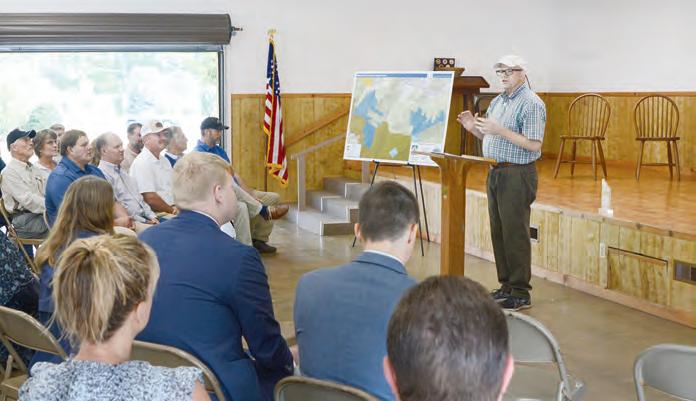

Learn about the upcoming partial solar eclipse during a session at 4 p.m. Wednesday, Oct. 4, at the Jackson County Public Library in Sylva with Matt Cass, a physics instructor at Southwestern Community College.
The eclipse will occur on Saturday, Oct. 14. While the path of the total eclipse will

track far south of North Carolina, a partial eclipse between 40% and 50% of totality will be visible during the middle of the day. According to timeanddate.com, the maximum eclipse will be visible in Cherokee and Bryson City at 1:11 p.m., in Waynesville and Sylva at 1:12 p.m. and in Franklin at 1:15 p.m.
The library event is free and co-sponsored by Friends of the Jackson County Public Library. 828.586.2016.

The Jackson County Coon Hunters Association will hold a day full of events aimed at youth 15 and under 8 a.m. to 5 p.m. Saturday, Oct. 7, at 44 Oak Hill Drive in Sylva.

This Youth Day, Hall of Fame and Trade Day will start with field event signups at 8 a.m. followed by the events themselves at 9 a.m. Events will include a drag race, water race, treeing, bay and roll cage contests. Prizes will be awarded to winners, as well as raffles and door prizes. Lunch plates will be available for $10.
Contact Matthew Bryson for more information at 828.508.8465.

These conservation efforts went well beyond the MVSD boardroom.
In addition to the Forest Legacy Program and N.C. Land and Water Fund, the newly conserved acres were made possible with funding from the Stanback family — both the Brad and Shelli Stanback and the Fred and Alice Stanback families contributed — the Pigeon River Fund and individual landowners, all of whom sold their land for less than they would have received on the open market.
“I think it’s important to celebrate the conservation, but I think it’s really important to celebrate the partnership that made the conservation happen,” said Bill Holman, who until recently served as North Carolina director for The Conservation Fund.
Holman and his organization were a key part of that partnership, working over a period of years to identify funding and bring together partners to move the project forward. The Conservation Fund was the driving force behind not only the 710 acres that passed into MVSD ownership in 2019, but also such critical projects as the acquisition of 5,329 acres surrounding Waterrock Knob for transfer to the Blue Ridge Parkway and 912 acres of undeveloped high-elevation land adjoining Sylva’s Pinnacle Park.
Someday, Holman hopes to see a continuous thread of conserved land connecting all

the way from Sylva up to the Blue Ridge Parkway and back down to Maggie Valley. This most recent conservation victory was a key milestone toward that goal.

“I’ve been in the conservation field about 40 years and worked on a lot of what I thought were complicated projects,” Holman said. “This may have been the most complicated one.”
The 710 acres protected in 2019 involved five or six individual tracts of land, said Kirk Kirkpatrick, who is legal counsel for the MVSD and served as closing attorney for the 1,250 acres. This more recent project involved 120 parcels of property, some of which were encumbered by deed restrictions.
“It was a real challenge,” he said. “But it’s also very rewarding to do this and do this for a county that my family has been part of since 1780. To protect this for future generations is just really amazing.”









During the N.C. Mountain State Fair Sept. 817, The Smoky Mountain News’ coverage area of Haywood, Jackson, Swain and Macon counties was well represented in the list of winners.
• Open Junior Dairy Cattle Show: Soll Sutton of Haywood County won Brown Swiss — Junior Reserve Champion Female; Raylee McGaha of Haywood County won Guernsey — Junior Champion Female.
• Open Dairy Cattle Show: Sheila Mills of Haywood County won Brown Swiss — Senior Reserve Champion Female and Reserve Grand Champion; Heath McGaha of Haywood County won Guernsey — Junior Champion and Junior Reserve Champion Female, Senior Champion Female, Junior Best Three Females and Breeder’s Herd of Five Females.
• Youth Junior Doe Show: Andi Setser of Macon County won Alpines — Junior Doe Reserve Grand Champion.
• Junior Meat Breed Ewe Show: Haylee Ledford of Macon County won Commercial Hair Reserve Champion Junior Meat Breed Ewe.
• Open Junior Beef Heifer Show: Montana

Boatwright of Macon County won Simmental Got to Be NC Reserve Grand Champion Junior Heifer; Macie Ledford of Macon County won All Other Breeds Reserve Grand Champion Junior Heifer; Hannah Smith of Macon County won All Other Breeds Got to Be NC Reserve Grand Champion
Junior Heifer, Commercial Grand Champion
Junior Heifer, Reserve Supreme Got to Be NC Champion Junior Heifer; Karissa Collins of Macon County won WNC District Junior Feeder Steer
Reserve Grand Champion, WNC District Junior Feeder Steer Got to Be NC Champion, WNC
District Market Steer Grand Champion and Reserve Grand Champion, WNC District Junior Market Steer Got to Be NC Champion.
• WNC District Junior Beef Market Steer Show: Karissa Collins of Macon County won WNC District Market Steer Grand Champion and Reserve Grand Champion, WNC District Junior Market Steer Got to Be NC Champion.
• WNC District Junior Beer Heifer Show: Hannah Smith of Macon County won Premier
Junior Beef Exhibitor, All other Breeds Reserve Grand Champion Heifer, Commercial Grand Champion Heifer; Macie Ledford of Macon County won All Other Breeds Grand Champion Heifer.
• N.C. Egg Association Recipe Contest: Jennifer Currie of Clyde took third place for her “Dear Me, This is Gouda” breakfast frittata recipe.
Expansive mountain top estate perfectly-positioned in a peaceful setting. Drive through the grand gate at the entrance to a stunningly crafted log home with breathtaking 360 degree mountain views overlooking the WNC mountains. This 18+ acre estate is surrounded by gorgeous landscaping and natural woods. The main entrance of


and butlers pantry. The lower level is perfect for visiting guests with bath and a loft area for a peaceThe outdoor area provides year pavilion with an outdoor kitchen

Forestry students show off their skills
Celebrate the forest heritage of Western North Carolina during the annual Forest Festival Day and John G. Palmer Intercollegiate Woodmen’s Meet, 10 a.m. to 5 p.m. Saturday, Oct. 7, at the Cradle of Forestry in America.
The event brings the whole Cradle of Forestry campus to life, showcasing forestry and traditional craft.


Forestry students from across the region will compete in the Woodmen’s Meet, which is hosted by Haywood Community College. Competitors will test their skills in events including archery, axe throwing, crosscut sawing and pole felling.

Meanwhile, traditional craftsmen will be on site, selling their wares and showing how they’re made. Various community partners will share information about their work and offer giveaways and other fun activities.

Learn the fundamentals of survival and first aid during Women’s Wilderness Weekend, coming up Oct. 13-15 at Nantahala Outdoor Center in Swain County.
Participants will get hands-on in the wilderness, spending quality time in the company of experienced teachers and like-minded women. The weekend includes both classroom and experiential education, Wilderness First Aid Certification, CPR and wilderness survival skills training in addition to yoga one morning and time to hang out by the firepit one evening. The program costs $425 and is open to women ages 16 and up. Discounts on lodging and dining are available for participants. Learn more or register at noc.com/events/womenswilderness-weekend.
MLS#4053785
$4,500,000

828.734.5201

A feature documentary exploring the release of the Pisgah-Nantahala Forest Plan, “The River Runs On,” is now available digitally.
During the 56-minute documentary, filmmaker Garrett Martin features some of the region’s top conservationists and most popular spots in the region as the documentary reflects on the public’s relationship to these lands and what the future may hold for this unique part of the world.
The film is available to rent or buy on Amazon.
An island campsite in the Great Smoky Mountains National Park is closed following a wildfire reported around 1:30 p.m. Tuesday, Sept. 26.
Firefighters were on scene by early evening and remained overnight to monitor and suppress the 10-acre fire, which occurred near backcountry campsite 87 on Fontana Lake’s shore. The fire was contained as of Thursday, Sept. 28, with firefighters continuing to monitor the area through the weekend.
No structures were threatened by the fire, and the cause is under investigation.
Applications are open through Thursday, Oct. 12, for participants in the fifth cohort of the Waypoint Accelerator, which is the first outdoor business accelerator east of the Rockies.
The Waypoint Accelerator program harnesses the expertise of dozens of mentors and partners, and the connectivity
and comradery of almost 150 businesses in the Outdoor Business Alliance, to elevate outdoor businesses and entrepreneurs in their initial years of operation to reach their next peak, and set a clear path for a vibrant and successful future.
The program runs Nov. 2 through March 7, 2024, and is designed for busy entrepreneurs from across the region. Only three in-person meetings are required. The cost is $550 per company, covering up to two participants.
For more information, visit mountainbizworks.org/waypoint-accelerator.

Dry conditions have returned to the mountain region, with parts of Macon, Jackson, Buncombe, Transylvania and Henderson counties labeled as abnormally dry in the most recent U.S. Drought Monitor map.
The map, released Sept. 28, is based on data gathered through Sept. 26. Little rain has fallen since then, and the forecast remains dry.
With fall now in full swing, the N.C. Forest Service is asking people to be careful, ready and responsible when burning outdoors. Wildfires occur most frequently from October through early December, with nearly 6,400 wildfires burning more than 24,000 acres in North Carolina during 2022. In 99% of cases, these fires were human-caused.
“As more of our state’s acreage is developed and our population continues to grow, we’ll have more people actively living and recreating in areas where homes and forest and woodlands meet,” said Agriculture Commissioner Steve Troxler. “Increased human activity traditionally leads to more wildfires.”
North Carolina is in the top 5% nationally for the number of acreage and housing units in the wildland urban interface, which is the area where human development blends with undeveloped wildland, forest or vegetation. As of 2020, roughly 2.25 million homes and more than half of North Carolina’s citizens lived in these areas.
Before burning, ensure you have a valid permit, ensure you are fully prepared to control the fire, never use flammable liquids to speed up burning, douse all embers thoroughly with water and stay with the fire until it is completely out. Check the weather and never burn on dry, windy days. Keep the fire small. For more information, visit resistwildfirenc.org.

A moderate to strenuous 3.5-mile hike exploring the Waynesville Watershed will embark at 10:30 a.m. Tuesday, Oct. 17.

The group will meet at the town’s water treatment plant and return by 2 p.m. This protected 8,000-acre watershed is not typically open to the public and
The recently adopted 2023-2025 state budget includes $2.5 million for trail construction in the Pisgah National Forest surrounding Old Fort. The allocation represents a portion of the $24.9 million total set aside for specific trail and greenway projects statewide.



To be appropriated to the Camp Grier G5 Trail Collective, the $2.5 million will be used for 25-30 miles of trail over the next two years in the Grandfather Ranger District.

“This ground-breaking investment in Old Fort is a true testament to the importance of national forests as an asset for our local communities,” said James Melonas, Forest Supervisor for the National Forests in North Carolina.

Planning for the Old Fort Trails Project was approved in late 2021 as a vision to build 42 miles of new multi-use trails from Catawba Falls to Curtis Creek at the edge of the Blue Ridge Mountains.
Hear the true trail story behind the book “Jingles’ Promise” at 6 p.m. Thursday, Oct. 12, at the Macon County Public Library in Franklin.
Norm Morris, whose trail name is Jingles, will share his Appalachian Trail journey from Georgia to Maine, while his wife, Rochelle,
provides fresh drinking water for many Haywood County residents.
Hikers should bring lunch and water, and be prepared to hike through mud. No pets. Space is limited to 15 people. Free for Haywood Waterways members with a $5 donation requested from nonmembers.
Reserve a spot with Christine O’Brien, christine.haywoodwaterways@gmail.co m or 828.476.4667, ext. 1.

To date, 10 miles of trails have been opened, including the new Old Fort Gateway Trails. The additional 25-30 miles of construction funded by this allocation will bring the project close to completion by 2025.
The project is the third largest named in the budget, with the biggest chunk of funding, $12 million, going to Conserving Carolina for continued development of the Saluda Grade Corridor Trail in Henderson and Polk counties, while Columbus Jobs Foundation, Inc., in Columbus County will get $4 million for a walkway, trail project and related capital improvements.
Ten smaller appropriations go to a variety of projects scattered over the state. These include $2 million to the town of Blowing Rock in Watauga County for the Middle Fork Greenway and $200,000 to Friends of the Overmountain Victory Trail, which covers 225 miles in Rutherford, Burke, Caldwell, Wilkes, McDowell, Avery and Mitchell counties.
Additionally, the budget includes $25 million to start a new trail and greenway funding program called the Great Trails State Program and $5 million for the Complete the Trails Fund, which supports authorized North Carolina State Trails.
whose trail name is SherpaShell, offered support from the backroads in their camper van. Together, they will reflect on their experiences with hope of helping others recover from loss and trauma.
The program is co-sponsored by the library and Nantahala Hiking Club, with visitors welcome and a free raffle. Books will be available for purchase.
Puzzles can be found on page 38

























These are only the answers.
Every year at the beginning of fall, an amazing thing happens in North America, and the Southern Appalachian Mountains. One of the most amazing animal migrations just passes through Western North Carolina, and not only can you go witness it, but you can also help these amazing animals along the way.

Every year monarch butterflies (Danaus plexippus) set out from their summer homes in the northern U.S. and Canada to fly 3,000 miles to their wintering grounds in warmer climates. And each year they follow the same or similar routes as in previous years. They stop and drink nectar from the same fields of wildflowers, roost overnight in the same trees, and follow a similar route as their ancestors have the previous years, for millions of years. And sometimes, if you are lucky and time it well, you can find them on the Blue Ridge Parkway and stand among hundreds of monarchs swooping down for nectar or flying southward on their journey.
The majority of monarch butterflies spend the winter huddled in trees together by the millions in the mountains outside of Mexico City. They will leave the warm safety of numbers to flit down and drink nectar from flowers during the warmer days, and then gather in such amazing masses back in the trees that their weight, the weight of butterflies, causes the branches to droop and hang.
In the late winter, they leave Mexico and begin their long, multi-generational migration towards Canada and the northern U.S. It takes them three generations, all dependent on the many species of milkweed plants (Asclepias spp.) that serve as hosts for their caterpillars. These milkweeds, and a couple of other plant species that used to be in the milkweed genus of Asclepias, are the only plants in the world that monarchs will lay their eggs on, as it is the only food their caterpillars will eat. And you thought you had a picky child?
The monarchs then spend the summer in their northern reaches for two or three more generations, flying about and doing what monarchs do on their summer vacation. You know, drinking nectar, pollinating flowers, waterskiing, having barbecues, just normal summer vacation stuff. And then, in the fall they will fly all the way back to Mexico in one single, long-lived generation to reach the
same overwintering grounds that their great, great, great, great, great, and sometimes great-grandparents did the year before. And they have been making this same journey, year after year, for millions of years. It is mind-boggling to me.
And you can help them. In fact, this species, and so many others, could use our help. Our culture has decimated their traditional habitats and migration routes by replacing the native plants they evolved with, with millions of acres of corn, soy,

wheat, lawns, golf courses and exotic plant landscapes. By planting and encouraging native plants back into these areas, we can help to make sure that the monarchs continue this journey long into the future.
They need milkweeds that are native to your bioregion for their spring journey. And in the fall, the adults rely on the abundance of nectar produced by asters (Symphyotricum and Eurybia spp.), goldenrods (Solidago spp.), ironweeds (Vernonia spp.), Joe Pye weeds (Eutrochium spp.) and other late-blooming flowers. As do so many other species of moth, butterfly, bees, wasps and other insects. If we continue to think of these plants as weeds and mow them down or spray them to death before they bloom, we will continue to see a decline in insect species all around.
This week, the monarch butterflies are migrating through the mountains, flying south and drinking nectar. I encourage you to go up onto the Blue Ridge Parkway and see if you can find them. Some common spots are the Cherry Cove Gap Overlook, Haywood Gap, Devil’s Courthouse parking area, Caney Fork Overlook and other spots along the way with an abundance of wildflowers in bloom. But do be careful as you drive along scanning the roadsides and skies for signs of monarchs, as the road is curvy and filled with tourists this time of year.

(Adam Bigelow lives in Cullowhee. He leads weekly wildflower walks most Fridays and offers consultations and private group tours through Bigelow’s Botanical Excursions. bigelownc@gmail.com.)

• The Jackson County Farmers Market meets every Saturday November through March 10 a.m. to 1 p.m. and April through October 9 a.m. to noon at Bridge Park in Sylva, 110 Railroad St. Special events listed on Facebook and Instagram.
• The Jackson Arts Market takes place from 1-5 p.m. every Saturday at 533 West Main St. in Sylva with live music and an array of local artists.
• REACH of Haywood County invites the public to a free event, Creating a Trauma-Informed Community Response to Domestic Violence, to be held 9 a.m. to 4:30 p.m. Oct. 5, at Charles M. Beall Auditorium in Clyde, with onsite registration 8-8:40 a.m. Visit reachofhaywood.org or call 828.456.7898 for more information.
• Mountain Area Pregnancy Services and the WIC Breastfeeding Peer Counselor work together to provide a casual support group for prenatal and breastfeeding individuals from 1-2 p.m. on Tuesdays at Mountain Area Pregnancy Services, 177 N Main St. Waynesville, NC. All are welcome, registration is recommended. For more information, please call 828.558.4550.
• The Western Carolina Cribbage Club meets every Monday at 6 p.m. An eclectic group of young and old, male and female. The group supplies boards, cards, pegs and are always willing to help those still learning the finer points of the game. Contact kei3ph@bellsouth.net for more information.
• Chess 101 takes place 3:30-4:30 p.m. every Friday at the Canton Branch of the Haywood County Library. For more information, email Ashlyn Godleski at ashlyn.godleski@haywoodcountync.gov or call 828.356.2567.
• Knit Night takes place at 5:30-7:30 p.m. every second Tuesday of the month at The Stecoah Valley Center. The event is free and open to the public. RSVP is recommended: 828.479.3364 or amber@stecoahvalleycenter.com.
• A Novel Escape Book Club takes place at 6:30 p.m. on the first Tuesday of every month at the Novel Escape Bookstore (60 E Main St, Franklin). Every other month one book is selected for discussion. On alternate months the meeting is round-table discussion in which participants share what they’ve read lately. For more information call the bookstore at 828.369.9059 or visit anovelescapefranklin.wordpress.com.
• Ron Rash will speak on his new book “The Caretaker” during an event at 7 p.m. Tuesday, Oct. 10, in the Fangmeyer at Hart Theater in Waynesville. Hosted by Blue Ridge Books, tickets are $10. Profits will be donated to the Pigeon Center.
• The Arts Council of Macon County and the Macon County Library are partnering to offer Traditional Mountain Clogging with Cheryl Renfro at 3:30 p.m. Thursday, Oct. 12, at the Macon County Library. For more information call 828.524.3600 or visit fontanalib.org.
n To have your item listed email to calendar@smokymountainnews.com
• The Arts Council of Macon County and the Macon County Library are partnering to offer Cherokee Dance with Bill Dyar at 3:30 p.m. Thursday, Nov. 9, at the Macon County Library. For more information call 828.524.3600 or visit fontanalib.org.
• Creative Writing Club will take place at 3:30 p.m. on the fourth Wednesday of every month at the Macon County Public Library. The writing club is intended for ages 8-12. For more information visit fontanalib.org or call 828.524.3600.
• Move and Groove Storytime takes place 10:30-11 a.m. every Thursday, at the Canton branch of the Haywood County Public Library. Exciting, interactive music and movement story time ideal for children 2-6 years old. For more information contact Ashlyn at ashlyn.godleski@haywoodcountync.gov or at 828.356.2567.
• Mother Goose Storytime takes place 10:30-11 a.m. every Wednesday, at the Waynesville branch of the Haywood County Public Library. Ideal for children from birth to 2 years old. For more information, contact Lisa at lisa.hartzell@haywoodcountync.gov or call 828.356.2511.
• Wiggle Worms Storytime takes place 10:30-11 a.m. every Tuesday, at the Waynesville branch of the Haywood County Public Library. Ideal for children 2-6 years old. For more information contact Lisa at lisa.hartzell@haywoodcountync.gov or call 828.356.2511.
• Storytime takes place at 10 a.m. every Tuesday at the Macon County Library. For more information visit fontanalib.org or call 828.524.3600.
• Toddler’s Rock takes place at 10 a.m. every Monday at the Macon County Library. Get ready to rock with songs, books, rhymes and playing with instruments. For more information visit fontanalib.org or call 828.524.3600.
• Culture Talk takes place at 2 p.m. on the first Wednesday of every month at the Macon County Public Library. Travel the world from inside your library. This event features guest speakers and food sampling from the location being discussed. For more information visit fontanalib.org or call 828.524.3600.
• Plott-tober Fest will run Oct. 5-8, and will feature Plott hound trials and a UKC Bench Show as well as German cultural events, children’s activities, traditional German cuisine and musical entertainment. The festival will be held at Canton’s Sorrells Park with additional events scheduled at the Museum of Haywood County History at the Shook-Smathers House in Clyde as well as Morning Star United Methodist Church in the Dutch Cove community of South Canton. For more information or admission visit nchchgs.org.
• “ColorFest,” Dillsboro’s 15th annual Fine Arts & Crafts Fair, will hit the streets 10 a.m. to 4 p.m. Saturday, Oct. 7, in historic Dillsboro. There will be local artisans and vendors, clogging, live music, food and more. For more information call Brenda Anders at Dogwood Crafters at 828.506.8331.
• Stecoah’s annual Harvest Festival will take place 6-8 p.m. Friday, Oct. 20, and 10 a.m. to 6 p.m. Saturday, Oct. 21. The festival celebrates all things fall with music, food, art and crafts vendors, country fair, quilt show, artisan demonstrations and more. For more information visit stecoahvalleycenter.com.
• Trivia Night is hosted 6:30-8:30 p.m. every Thursday evening at the Meadowlark Motel in Maggie Valley. For more information visit meadowlarkmotel.com.
• Mountain Makers Craft Market will be held from noon to 4 p.m. the first Sunday of each month at 308 North Haywood St. in downtown Waynesville. Over two dozen artisans selling handmade and vintage goods. Special events will be held when scheduled. mountainmakersmarket.com.
• Smoky Mountain Event Center presents Bingo Night with doors opening at 4:30 p.m. and games starting at 6 p.m. on the second Tuesday and fourth Monday of the month. For more information visit smokymountaineventcenter.com.
• “Flights & Bites” will be held starting at 4 p.m. on Thursdays and Fridays at Bosu’s Wine Shop in downtown Waynesville. For more information on upcoming events, wine tastings and special dinners, click on waynesvillewine.com.
• A free wine tasting will be held from 6-8 p.m. every Thursday and 2-5 p.m. every Saturday at The Wine Bar & Cellar in Sylva. 828.631.3075.
• Take a trip around the world with four different wines every Friday 11 a.m. to 8 p.m. and Saturday 11a.m. to 6 p.m. at the Bryson City Wine Market. Pick from artisan Charcuterie Foods to enjoy with wines. 828.538.0420
• There will be a glassblowing class to make pumpkins starting at 10 a.m. Saturday, Oct. 7, at the Jackson County Green Energy Park. No experience necessary, each spot costs $65, due at registration. For more information, or to register, contact the CEP at 828.631.0271.
• Wired Wednesday, one-on-one technology help is available at 3-5 p.m. every Wednesday at the Canton Branch of the Haywood County Library. For more information or to register, call 828.648.2924.
• Uptown Gallery, 30 East Main St. Franklin, will be offering Children’s Art Classes Wednesdays afternoons. Adult workshops in watercolor, acrylic paint pouring, encaustic and glass fusing are also offered. Free painting is available 10 a.m. to 3 p.m. every Monday in the classroom. A membership meeting takes place on the second Sunday of the month at 3 p.m. All are welcome. Call 828.349.4607 for more information.
• “Thursday Painters” group will be held from 10 a.m. to 3 p.m. on Thursdays at The Uptown Gallery in Franklin. Free and open to the public. All skill levels and mediums are welcome. Participants are responsible for their own project and a bag lunch. 828.349.4607 or pm14034@yahoo.com.
• Take a free guided tour of fall leaves at the Highlands Nature Center in Highlands at 4 p.m. any Friday or Saturday throughout October. No registration necessary. Tours are weather-dependent. For more information visit highlandsbiological.org.
• Learn about the upcoming partial solar eclipse during a session at 4 p.m. Wednesday, Oct. 4, at the Jackson County Public Library in Sylva with Matt Cass, a physics instructor at Southwestern
n Complete listings of local music scene
n Regional festivals
n Art gallery events and openings
n Complete listings of recreational offerings at health and fitness centers
n Civic and social club gatherings
Community College. The library event is free and cosponsored by Friends of the Jackson County Public Library. 828.586.2016.
• Hear the spectacular story of a Haywood County native’s expeditions to the world’s highest mountain peaks at 7 p.m. Friday, Oct. 6, at First United Methodist Church in Waynesville. This free presentation is sponsored by Environmental Action Community of Western North Carolina, with donations appreciated. Learn more at eacwnc.org.
• Jackson County Coon Hunters Association will host Youth Day, Hall of Fame and Trade Day for ages 15 and under from 8 a.m. to 5 p.m. Saturday, Oct. 7, at 44 Oak Hill Drive in Sylva. For more information contact Matthew Bryson at 828.508.6465.
• Learn how to raft guide with a three-day clinic Friday, Oct. 6, through Sunday, Oct. 8, at the Nantahala Outdoor Center in Swain County. Cost starts at $550. Participants must be at least 18 years old. Learn more or register at noc.com/courses/learn-to-raft-guide.
• Take a hunters education course at 9 a.m. Saturday, Oct. 7, at the Jackson County Recreation Complex in Cullowhee. The free course is open to ages 12 and up and limited to 15 participants. To register, visit register-ed.com/programs.
• Celebrate the forest heritage of Western North Carolina during the annual Forest Festival Day and John G. Palmer Intercollegiate Woodmen’s Meet, 10 a.m. to 5 p.m. Saturday, Oct. 7, at the Cradle of Forestry in America. The event brings the whole Cradle of Forestry campus to life, showcasing forestry and traditional craft.
• Trout Unlimited Sylva’s monthly dinner gathering will be held 6:15-8 p.m. Tuesday, Oct. 10, at the United Methodist Church on Jackson Avenue in Sylva. For more information, contact tu.sylva.373@gmail.com.
• Hear the true trail story behind the book “Jingles’ Promise” at 6 p.m. Thursday, Oct. 12, at the Macon County Public Library in Franklin. Norm Morris, whose trail name is Jingles, will share his Appalachian Trail journey from Georgia to Maine, while his wife Rochelle, whose trail name is SherpaShell, offered support from the backroads in their camper van. The program is co-sponsored by the library and Nantahala Hiking Club, with visitors welcome and a free raffle. Books will be available for purchase.
• Learn the fundamentals of survival and first aid during Women’s Wilderness Weekend, coming up Oct. 13-15 at Nantahala Outdoor Center in Swain County. The program costs $425 and is open to women ages 16 and up. Discounts on lodging and dining are available for participants. Learn more or register at noc.com/events/womens-wilderness-weekend.
• A moderate to strenuous 3.5-mile hike exploring the Waynesville Watershed will embark at 10:30 a.m. Tuesday, Oct. 17. The group will meet at the town’s water treatment plant and return by 2 p.m. Reserve a spot with Christine O’Brien, Christine.haywoodwaterways@gmail.com or 828.476.4667, ext. 1.
The Smoky Mountain News Marketplace has a distribution of 16,000 copies across 500 locations in Haywood, Jackson, Macon and Swain counties, including the Qualla Boundary and west Buncombe County. Visit www.wncmarketplace.com to place your ad!
Rates:
• $15 — Classified ads that are 25 words, 25¢ per word after.
• Free — Lost or found pet ads.
• $6 — Residential yard sale ads.*
• $1 — Yard Sale Rain Insurance
Yard sale rained out? Call us by 10a.m. Monday for your ad to run again FREE
• $375 — Statewide classifieds run in 170 participating newspapers with 1.1+ million circulation. (Limit 25 words or less)
• Boost Online — Have your ad featured at top of category online $4
• Boost in Print
• Add Photo $6
• Bold ad $2
• Yellow, Green, Pink or Blue Highlight $4
• Border $4
Note: Highlighted ads automatically generate a border so if you’re placing an ad online and select a highlight color, the “add border” feature will not be available on the screen. Note: Yard sale ads require an address. This location will be displayed on a map on www.wncmarketplace.com
p: 828.452.4251 · f:828.452.3585
classads@smokymountainnews.com www.wncmarketplace.com

NOTICE OF ADMINISTRATION
Case No.23E613
Sherry G Dewees, having Hester
Irene Shuler before Jan 04 2024, or Fiduciary 137 Morgan Street Waynesville NC 28786
NOTICE OF ADMINISTRATION
Case No.2023 E 000575
Billy Ray Gevedon before Dec 13 2023, or Administrator 11 Meadow Dr Horse Shoe, NC 28742
NOTICE OF ADMINISTRATION
Case No.2023 E 000497
Katherine
Ann Kelley
before Dec 13 2023, or Administrator 590 Auburn Rd Waynesville, NC 28786
NOTICE OF ADMINISTRATION
Case No.2023E 000555
This the 4th day of October 2023.
Sue Queen Hall Dec 13 2023
9999
authorized by the Laws assets belonging to the estate.
192 Pickle Springs Rd
NOTICE TO CREDITORS STATE OF NORTH CAROLINA
Anita Jeanette Laurin
WALK TO END ALZHEIMER’S GOT AN UNWANTED CAR?
• Brian K. Noland - bknoland@allentate.com

• Anne Page - apage@allentate.com
• Jerry Powell - jpowell@allentate.com
• Catherine Proben - cproben@allentate.com
• Ellen Sither - esither@allentate.com

• Karen Hollingsed- khollingsed@allentate.com
• John Keith - jkeith@allentate.com
• Randall Rogers - rrogers@allentate.com
• Susan Hooper - shooper@allentate.com
• Hunter Wyman - hwyman@allentate.com
•Julie Lapkoff - julie.lapkoff@allentate.com
•Darrin Graves - darrin.graves@allentate.com
ERA Sunburst Realty - sunburstrealty.com
•Rick Border - sunburstrealty.com

• Randy Flanigan - 706-207-9436
Keller Williams Realty - kellerwilliamswaynesville.com

•The Morris Team - www.themorristeamnc.com
• Ron Breese - ronbreese.com
• Landen Stevenson- landen@landenkstevenson.com
Lakeshore Realty
• Phyllis Robinson - lakeshore@lakejunaluska.com
Mountain Dreams Realty- maggievalleyhomesales.com

• Lyndia Massey- buyfromlyndia@yahoo.com
Mountain Creek Real Estate
• Ron Rosendahl - 828-593-8700
McGovern Real Estate & Property Management


• Bruce McGovern - shamrock13.com
RE/MAX Executive - remax-waynesvillenc.com remax-maggievalleync.com
• The Real Team - TheRealTeamNC.com
• Dan Womack - womackdan@aol.com
•Mary Hansen - mwhansen@charter.net

• Billy Case- billyncase@gmail.com
Rob Roland Realty
• Rob Roland - 828-400-1923

Smoky Mountain Retreat Realty


• Tom Johnson - tomsj7@gmail.com
• Sherell Johnson - Sherellwj@aol.com
ATTENTION OXYGEN THERAPY USERS!
HEARING AIDS!!
PREPARE
ATTENTION: VIAGRA & CIALIS USERS! A
Medical
DENTAL INSURANCE
DIAGNOSED WITH LUNG CANCER?
2018 SLX JAYCO 22’ CAMPER Living area, kitchen with 3 burner gas stove, microwave, queen bed. Heat/AC. Dual wheels. Like new condition. Must see to appreciate. $20,495.00 Cash Only. Serious inquires. Call 828-421-2209. (828) 421-2209
TIMESHARE CANCELLATION EXPERTS.
Automotive


SECURE YOUR HOME
Classes/ Instruction
GRANTHAM UNIVERSITY -
DON’T PAY FOR COVERED
Entertainment
FOR HIGH SPEED SATELLITE INTERNET
BCI - WALK-IN TUBS.

DIRECTV SATELLITE
WATER DAMAGE TO YOUR HOME? Call for

DISH TV
Legal, Financial and Tax
$10K+ IN DEBT?
Home Improvement
ELIMINATE GUTTER CLEANING FOREVER!
SAVE BIG ON HOME INSURANCE!
REPLACE YOUR ROOF
BEHIND ON YOUR MORTGAGE PAYMENTS?
